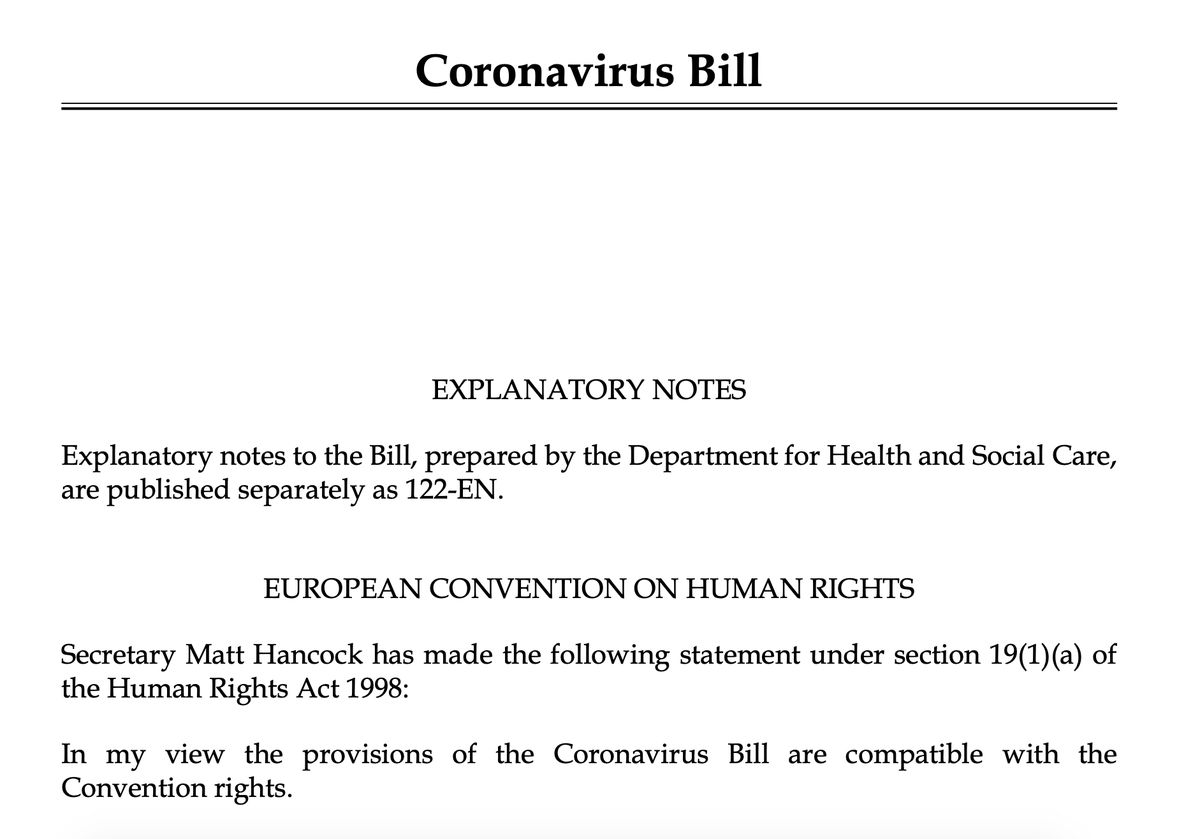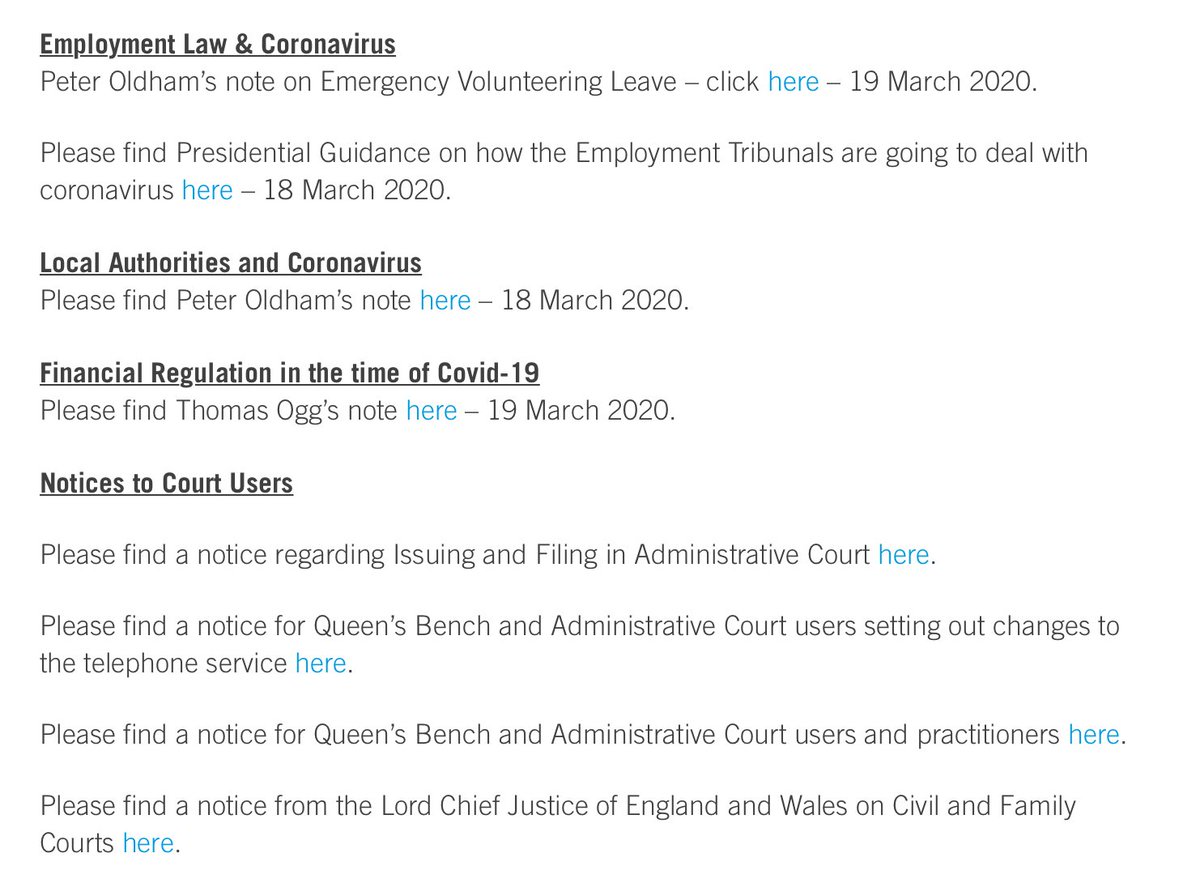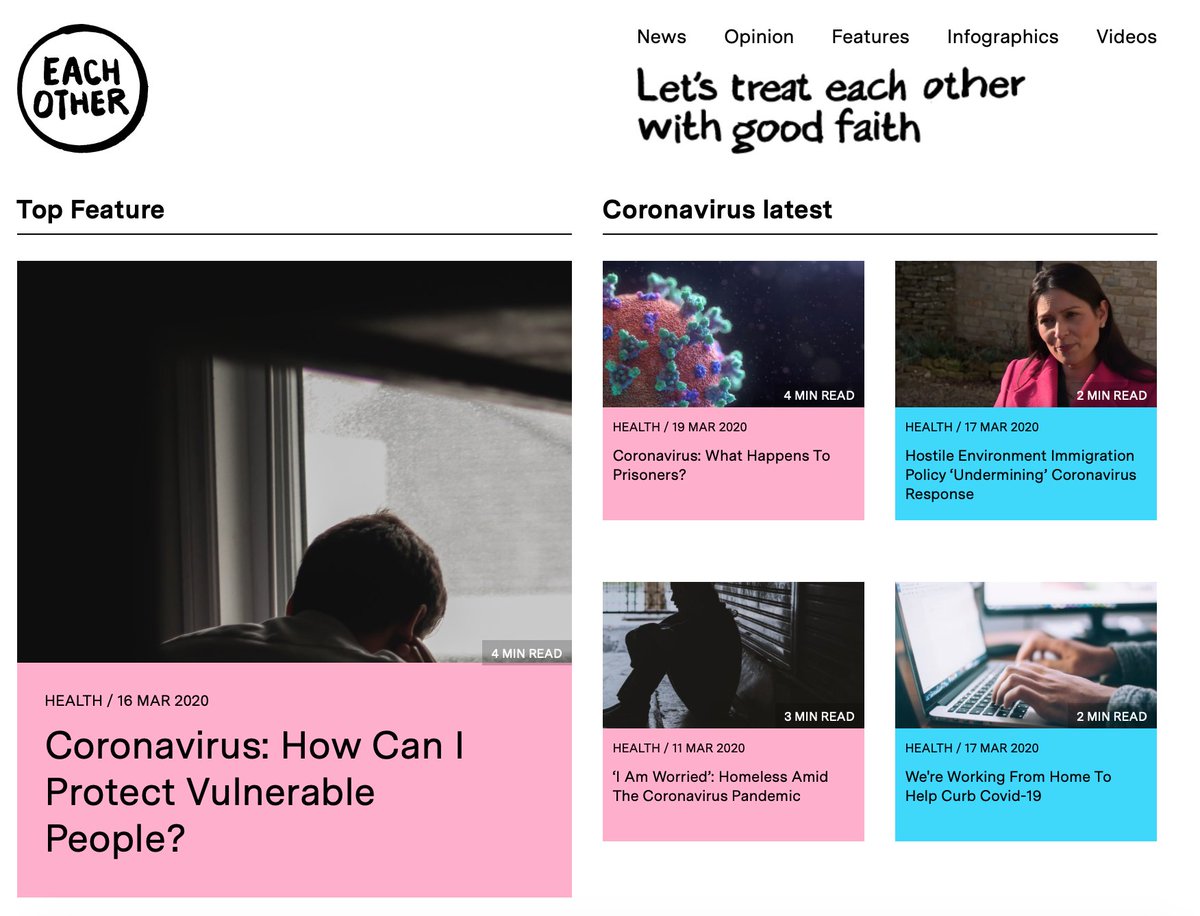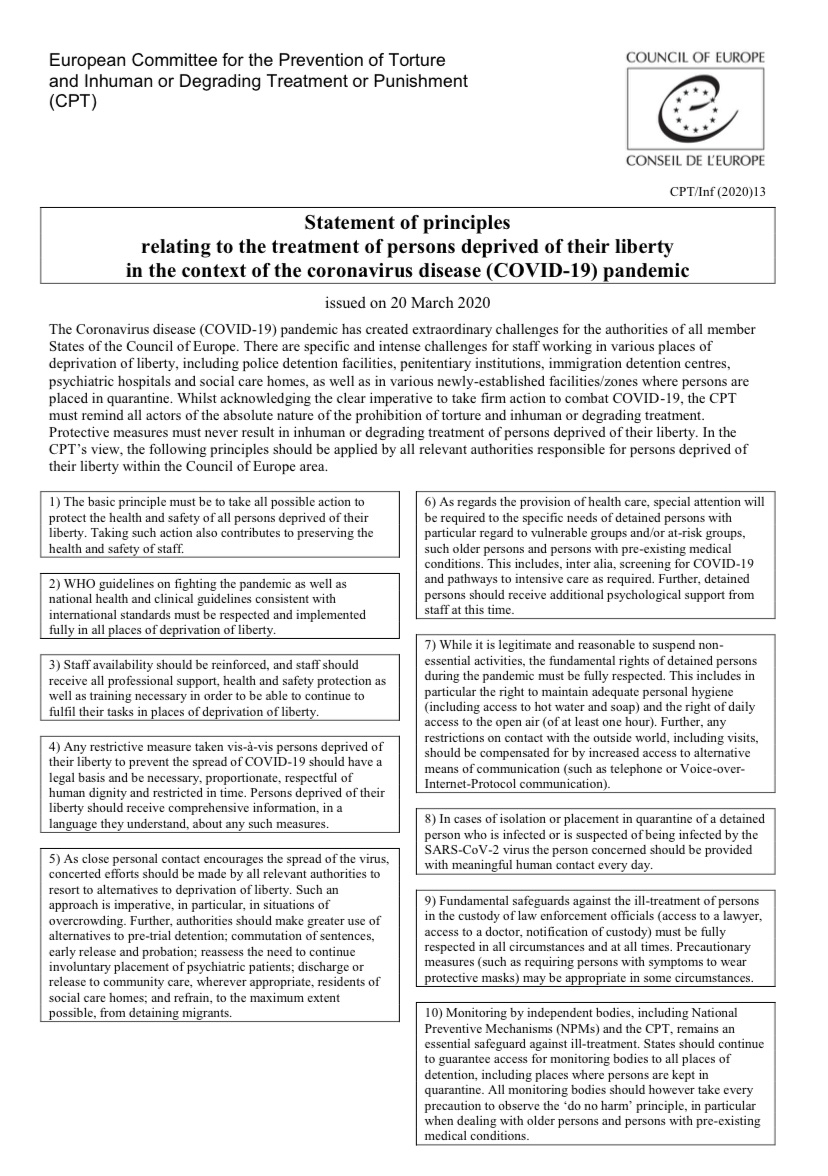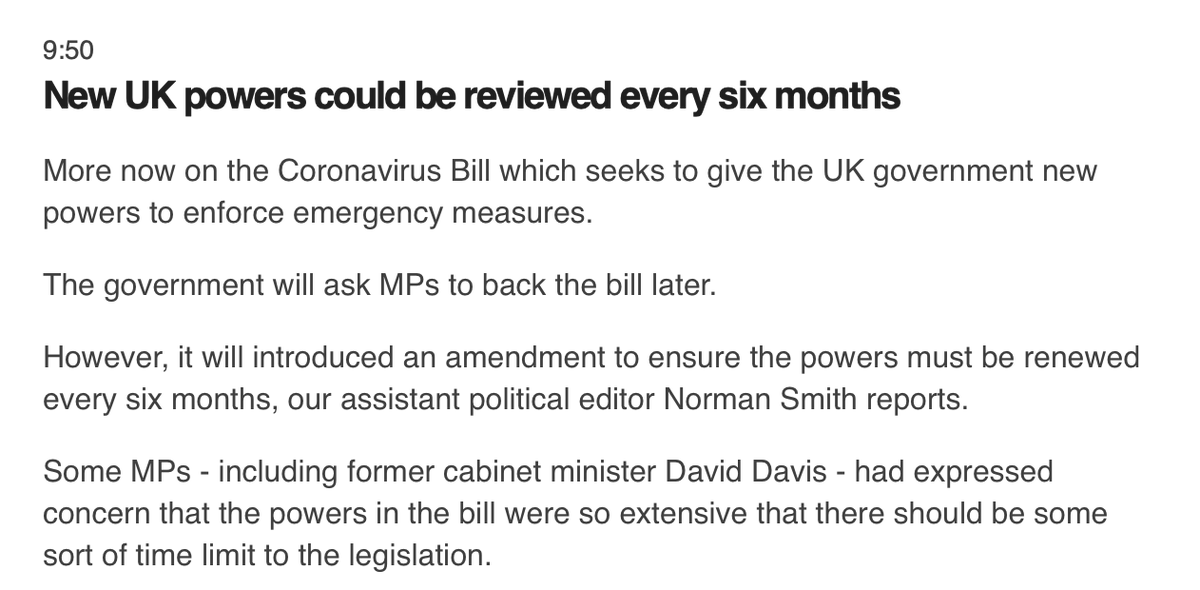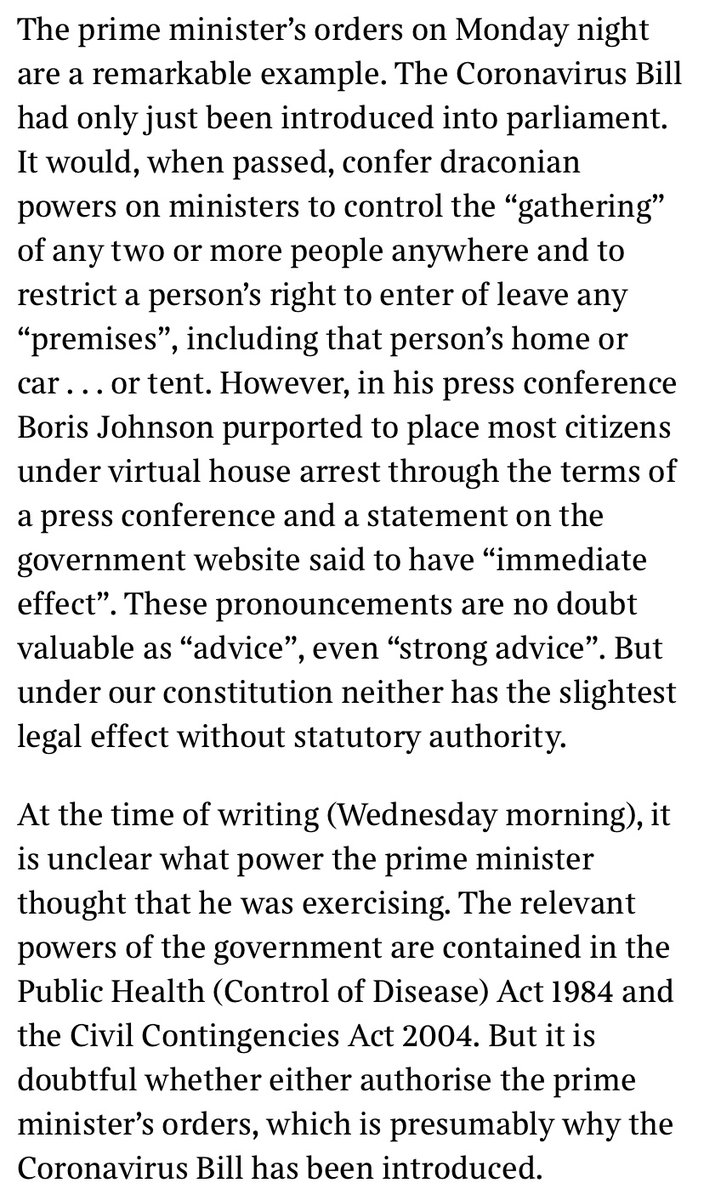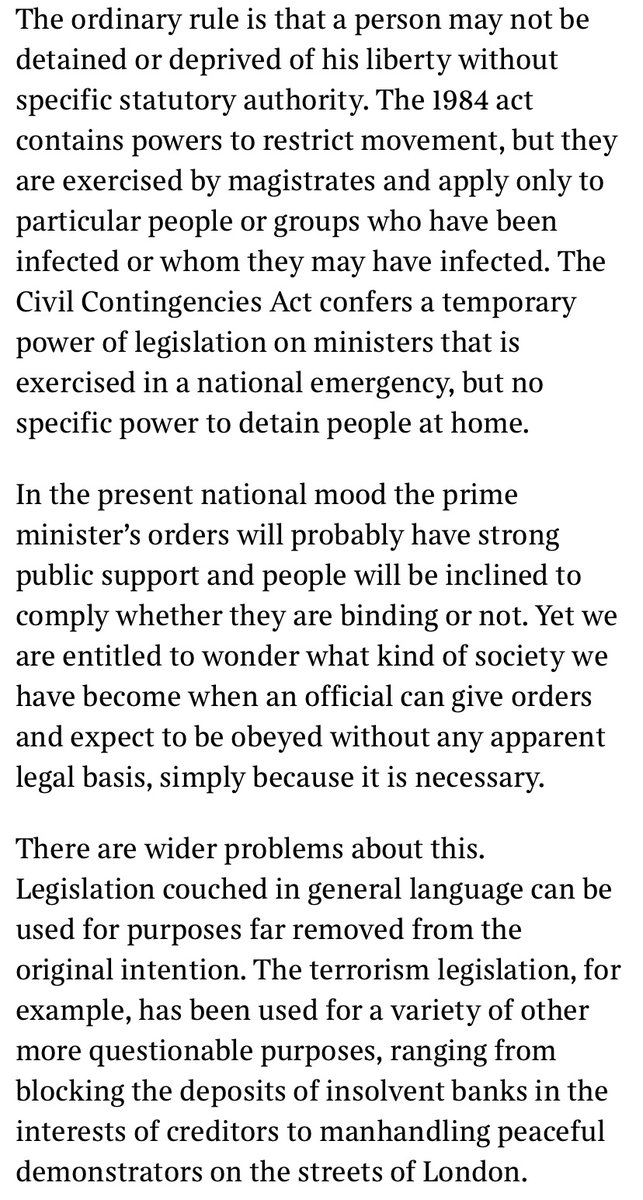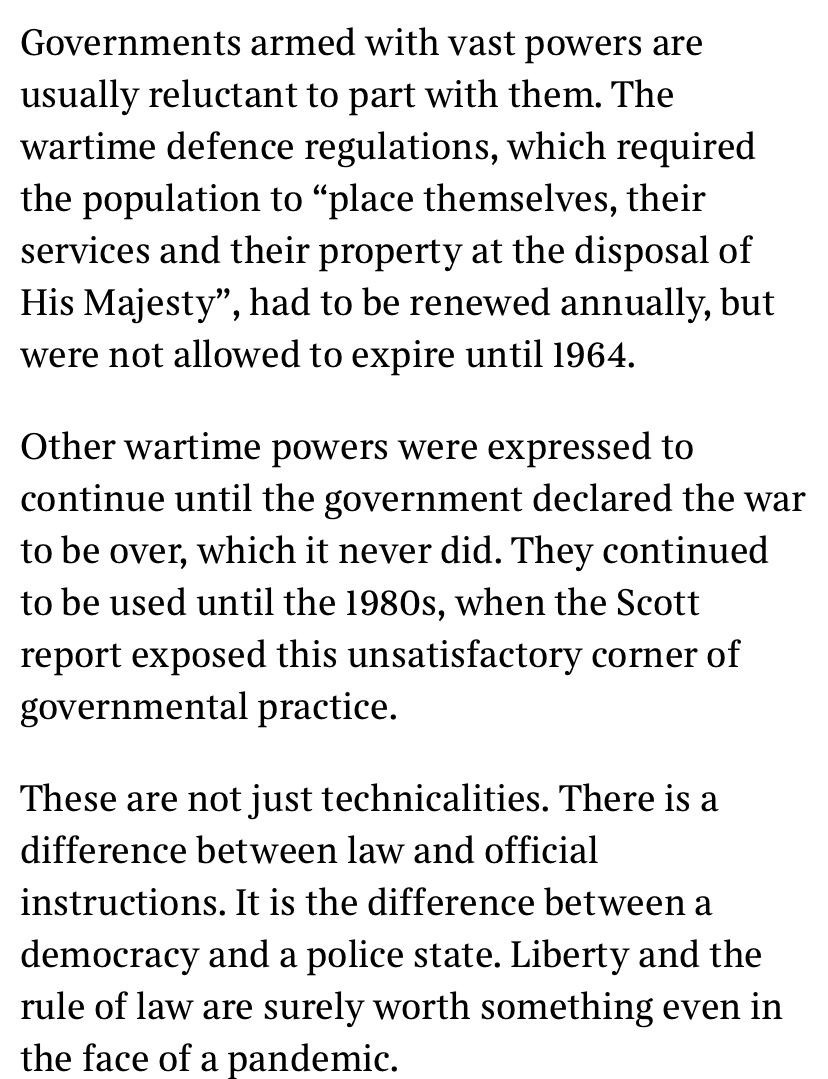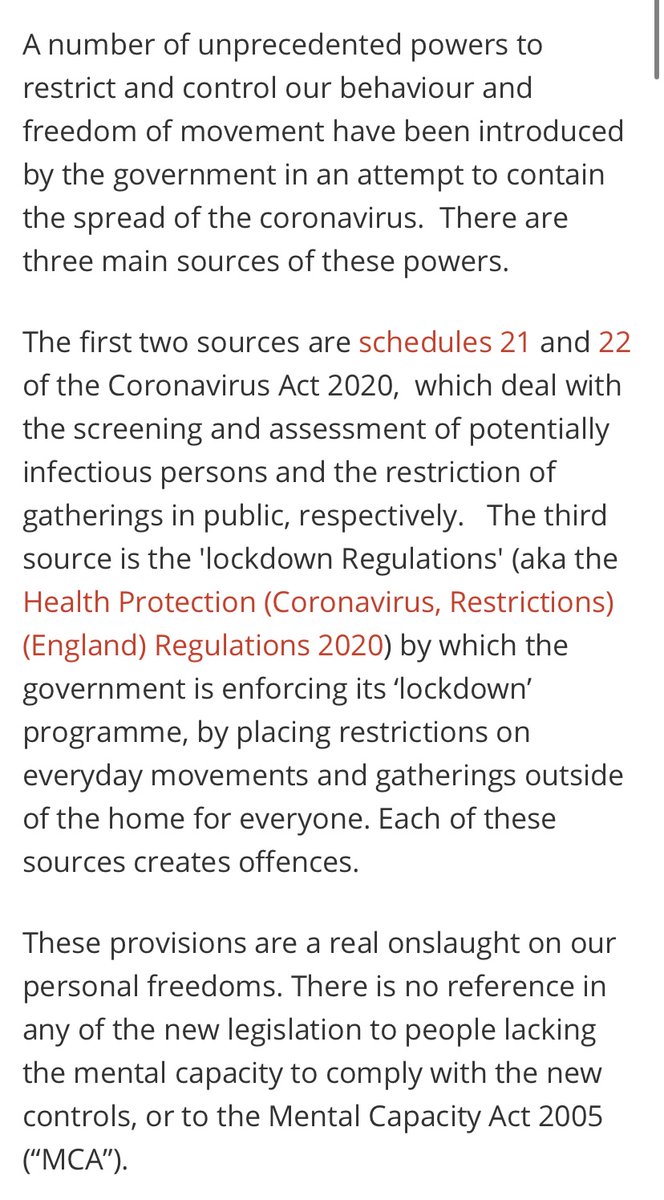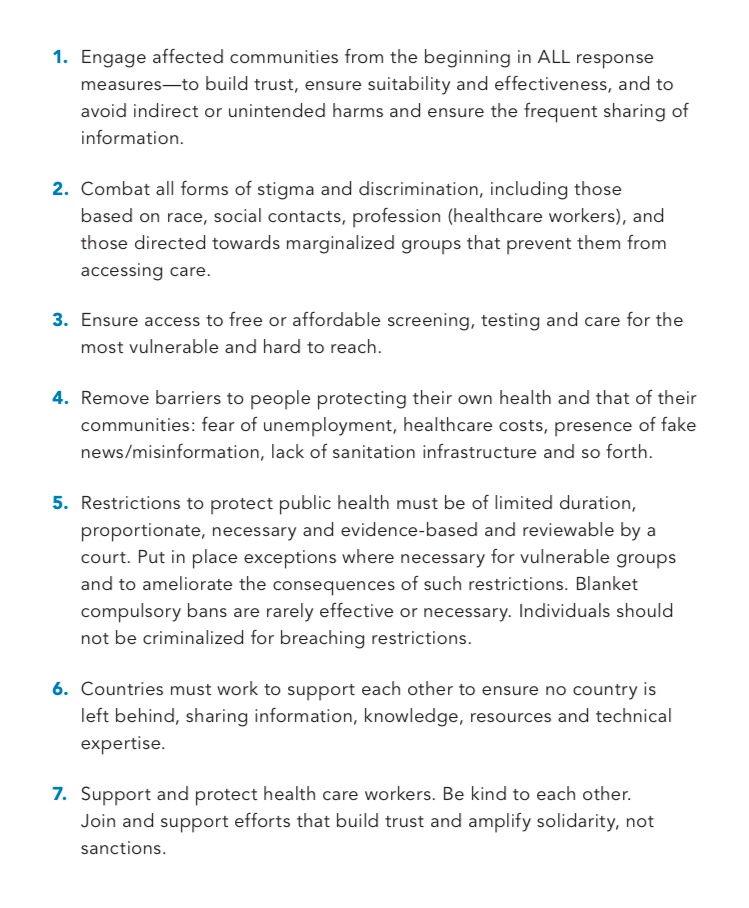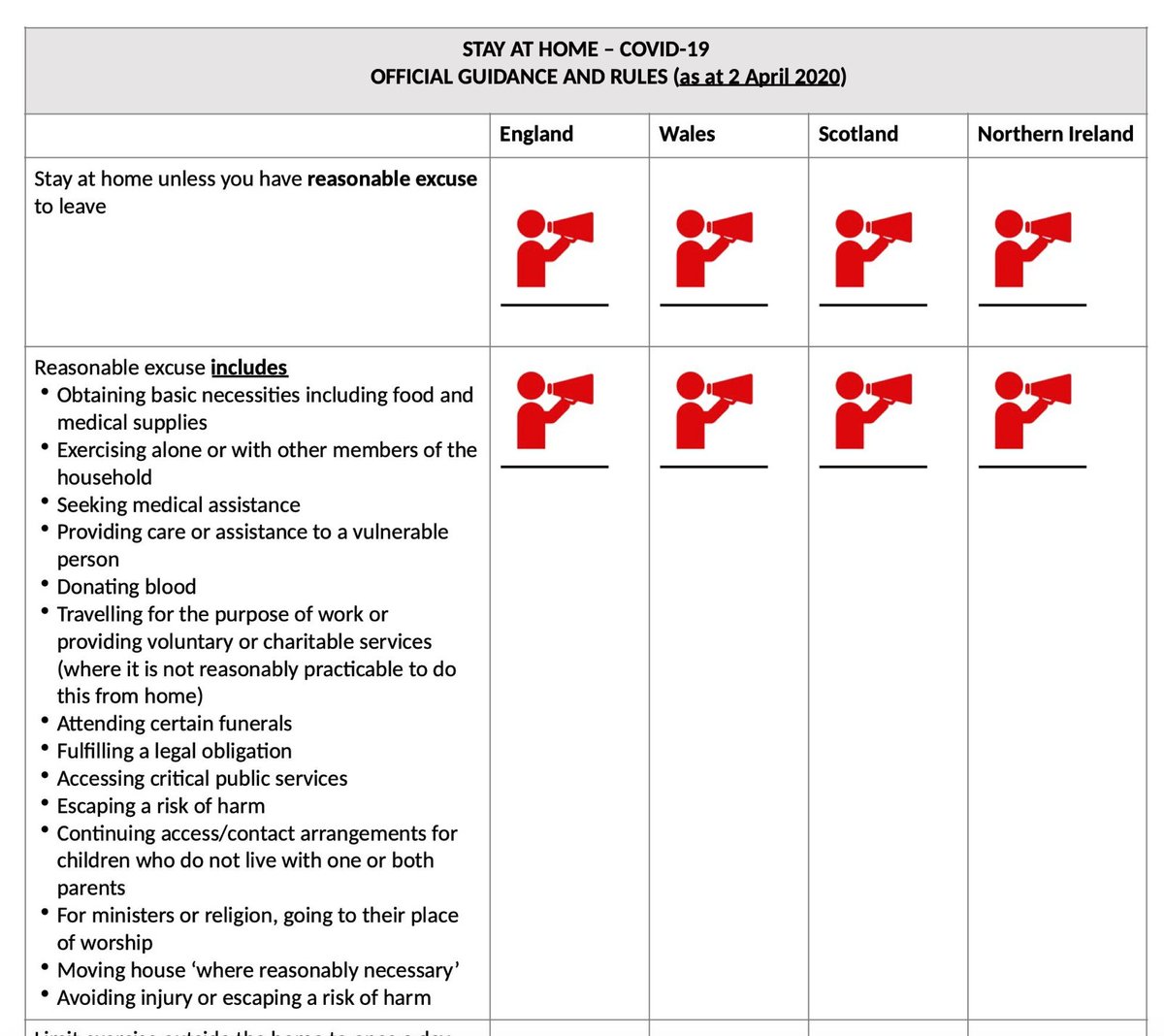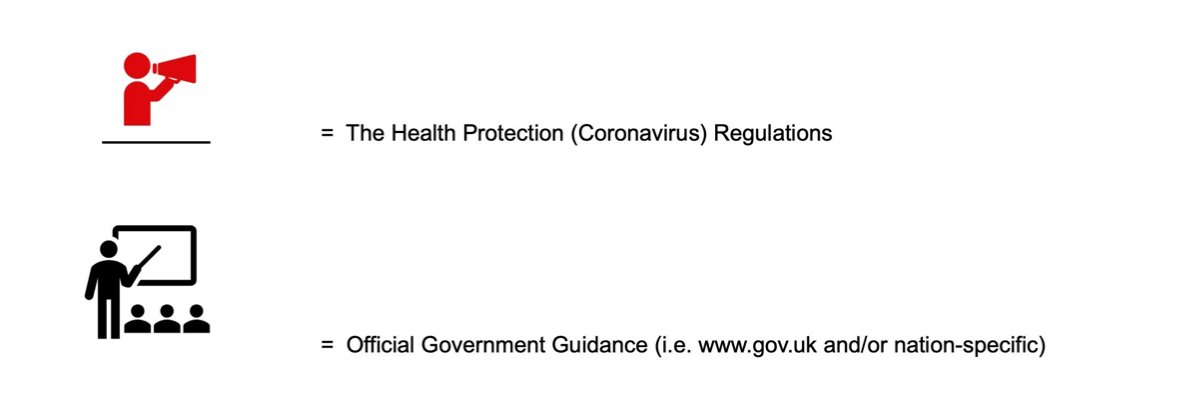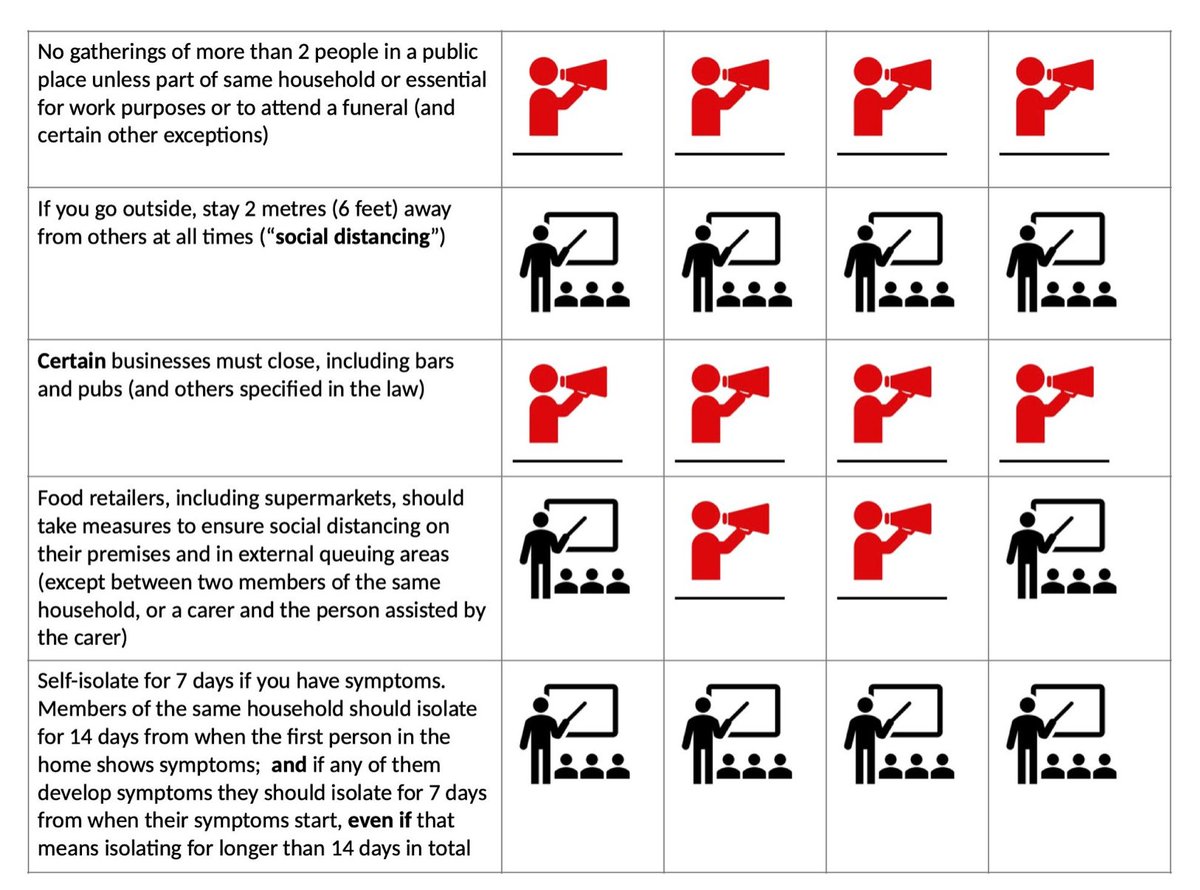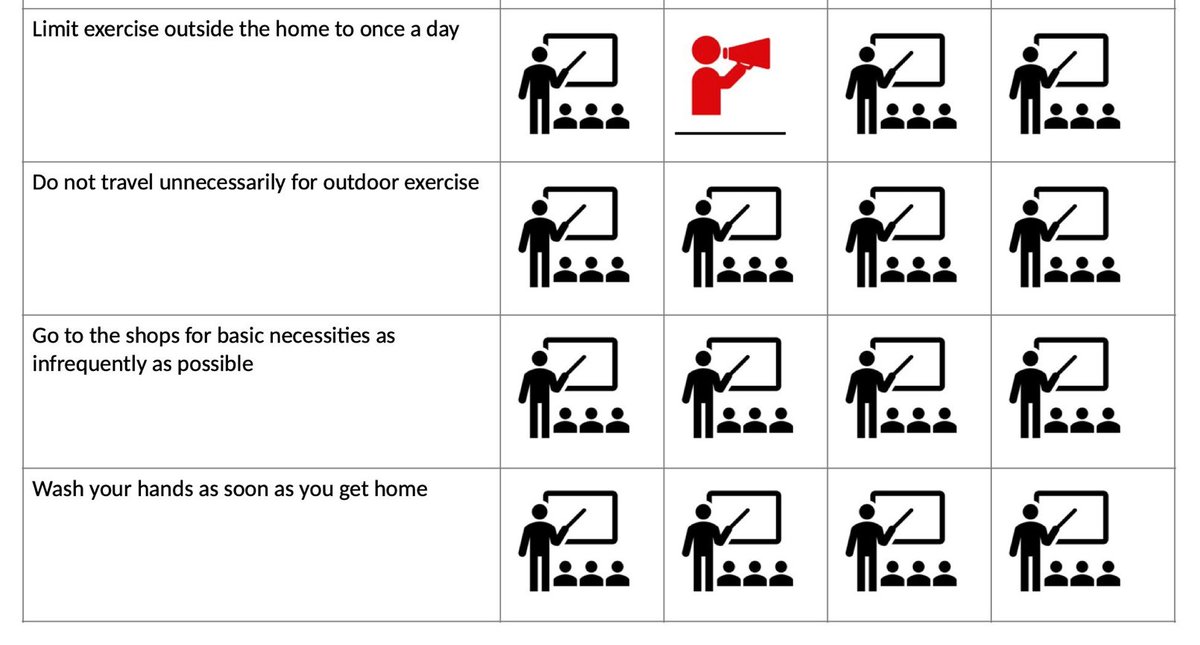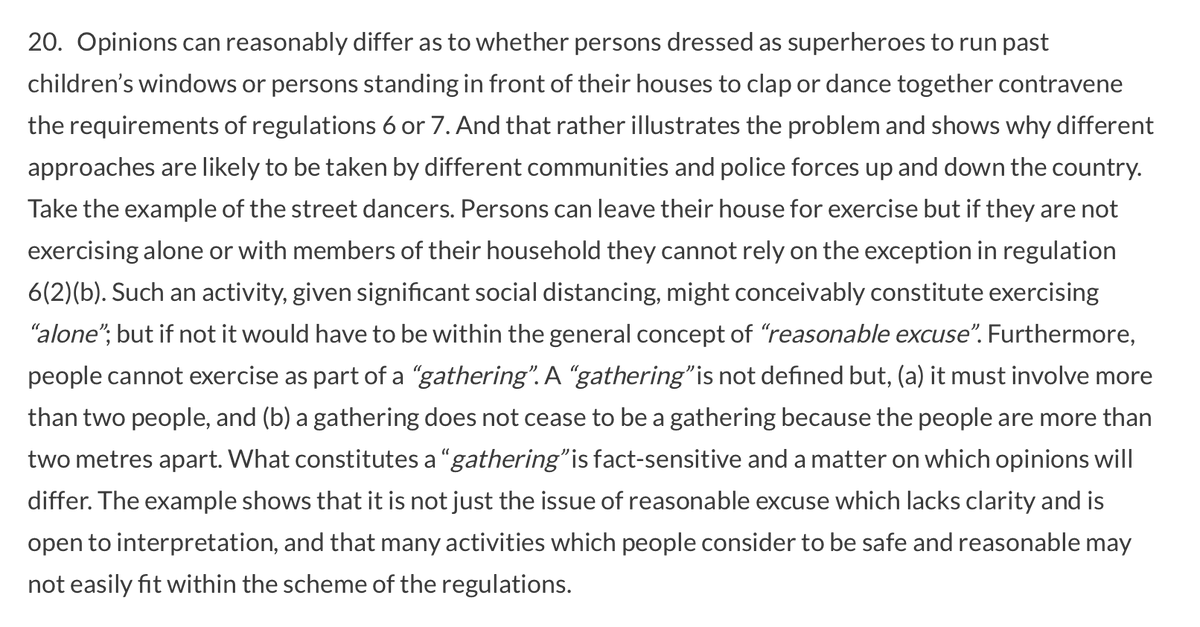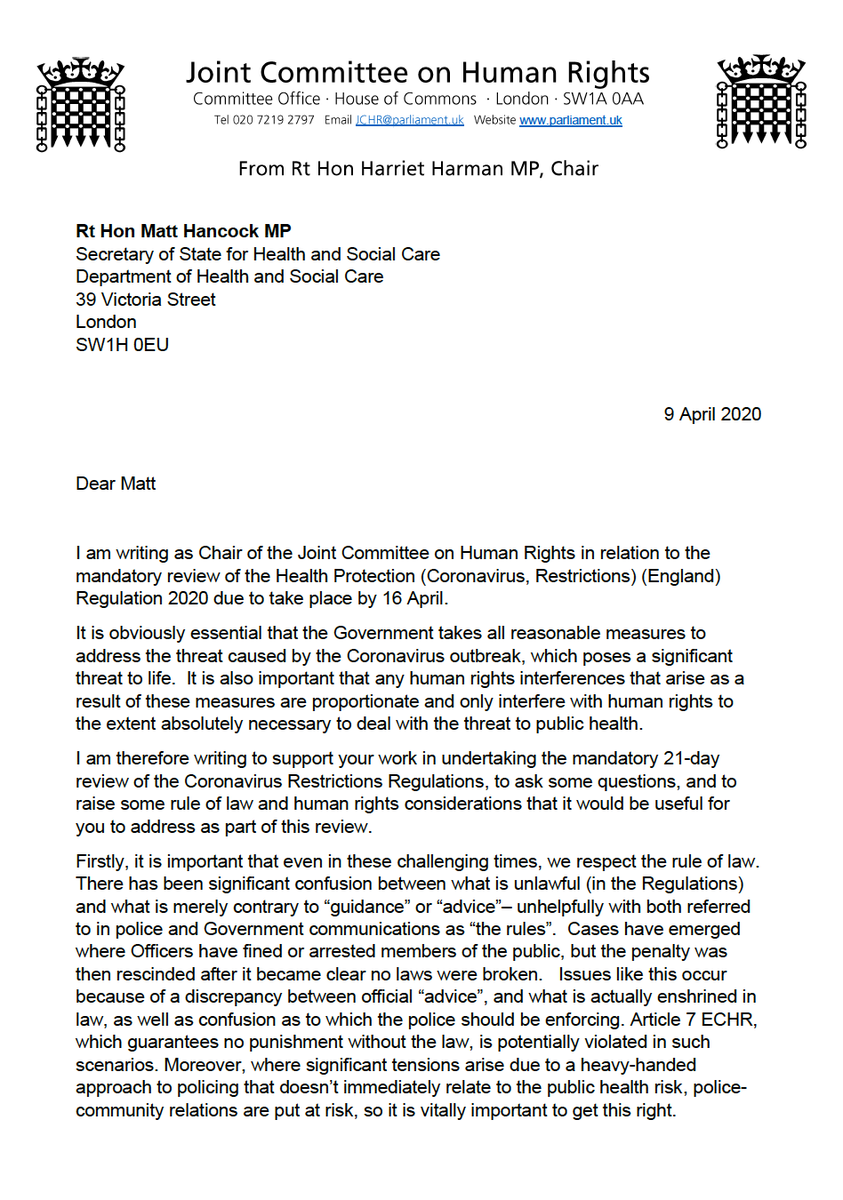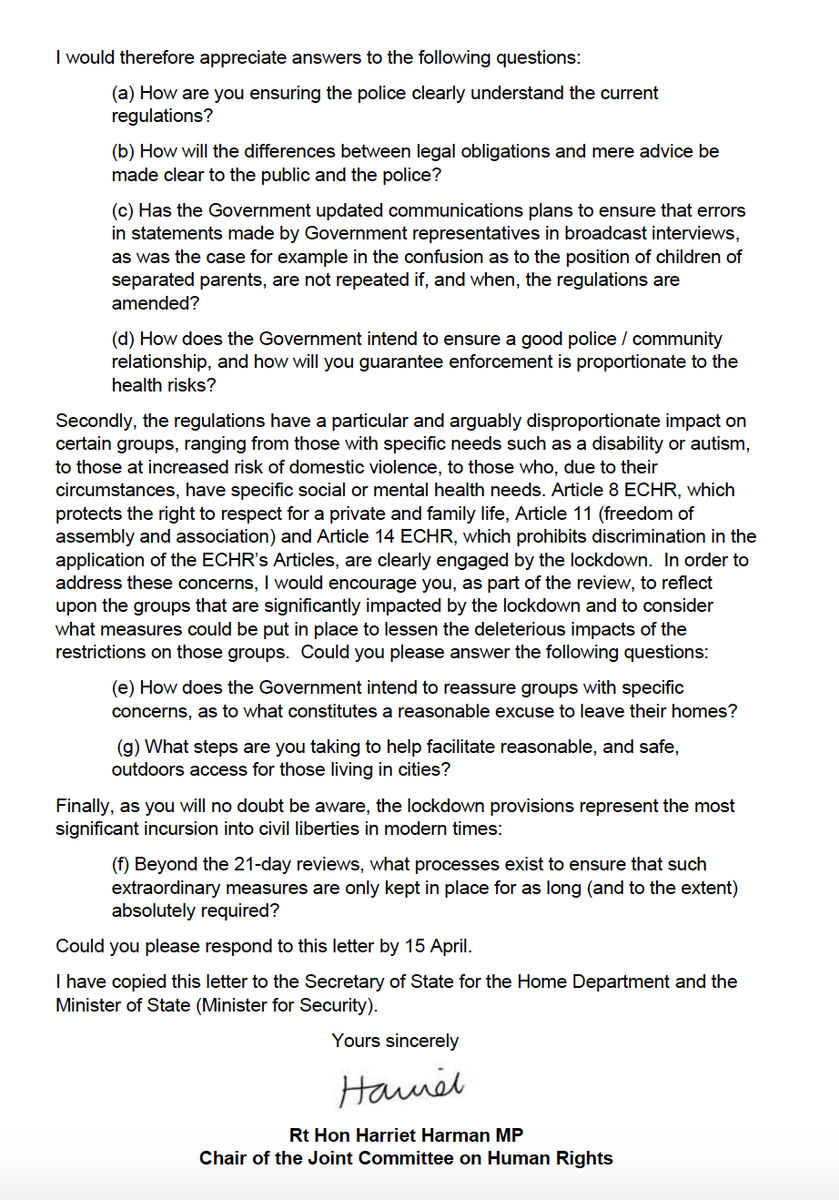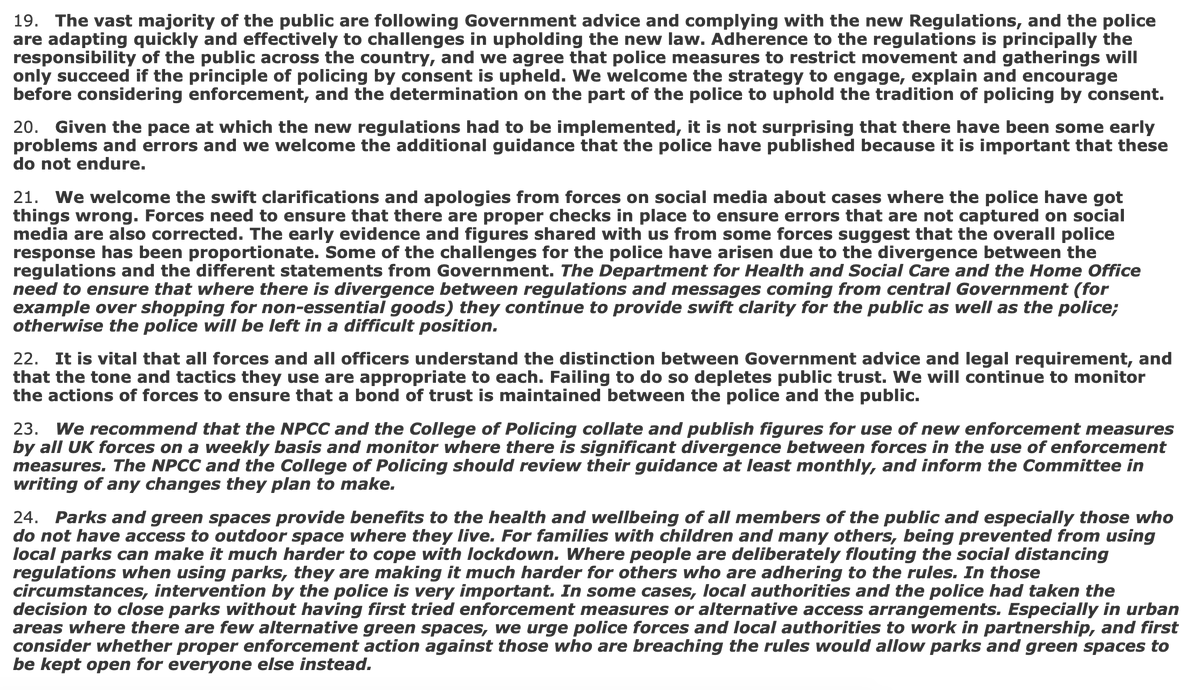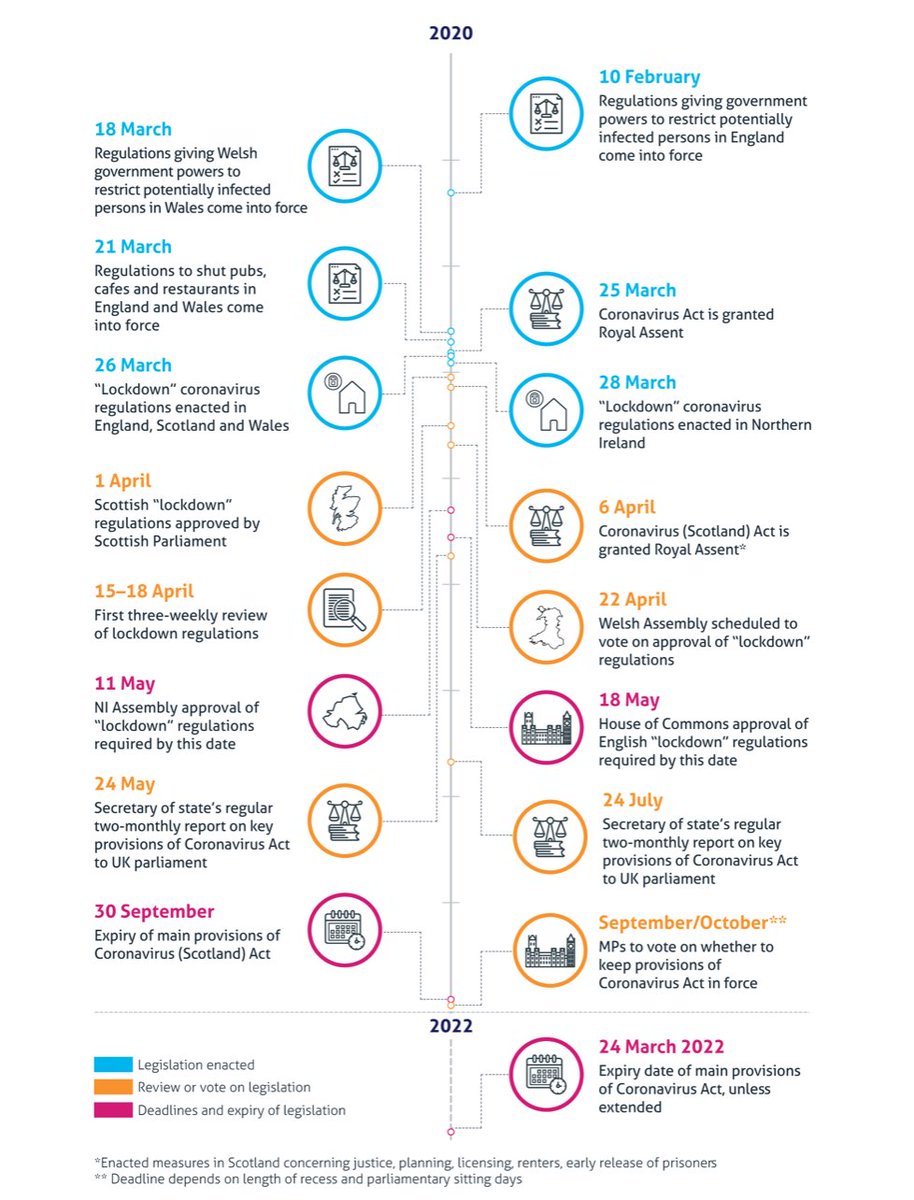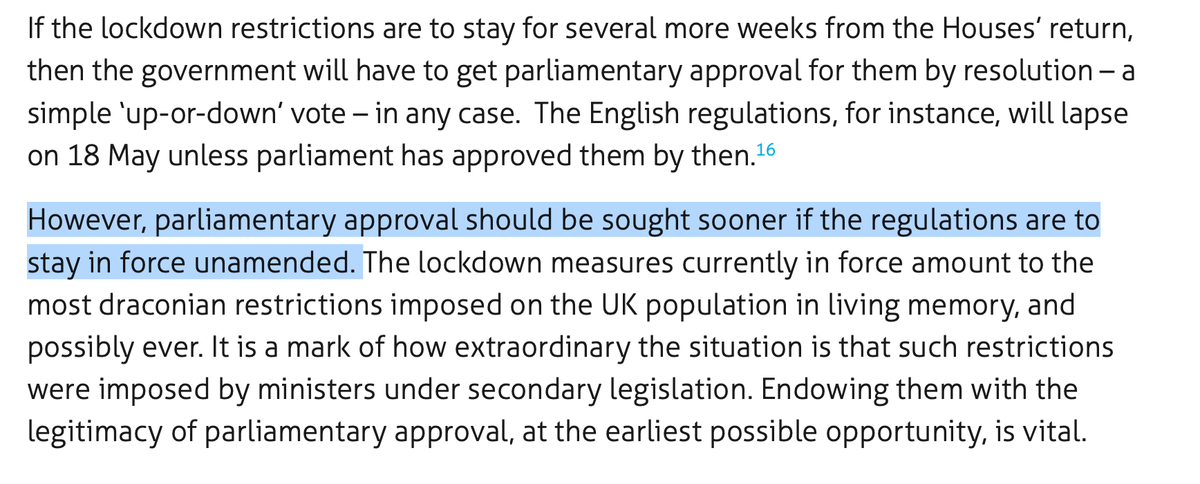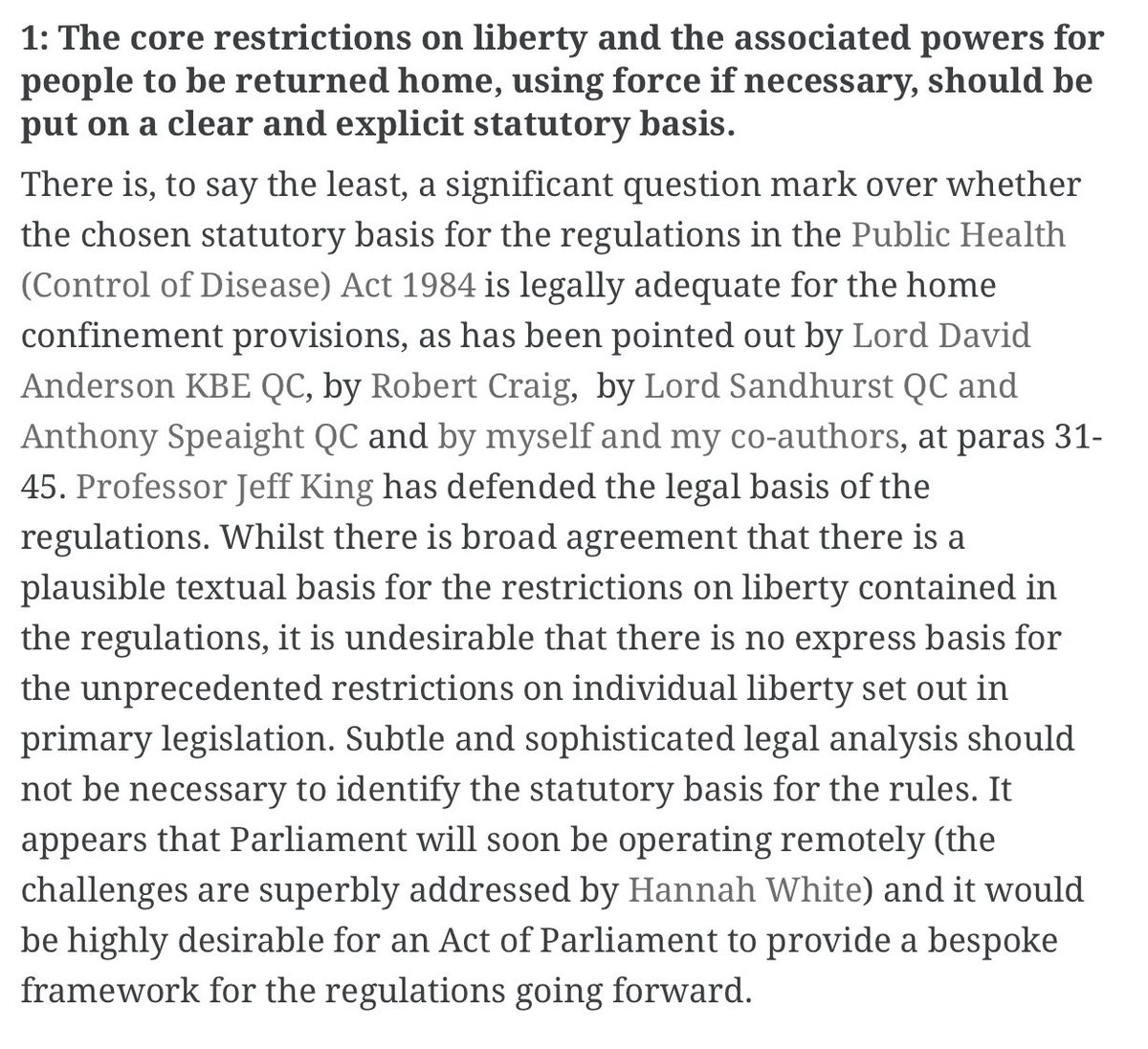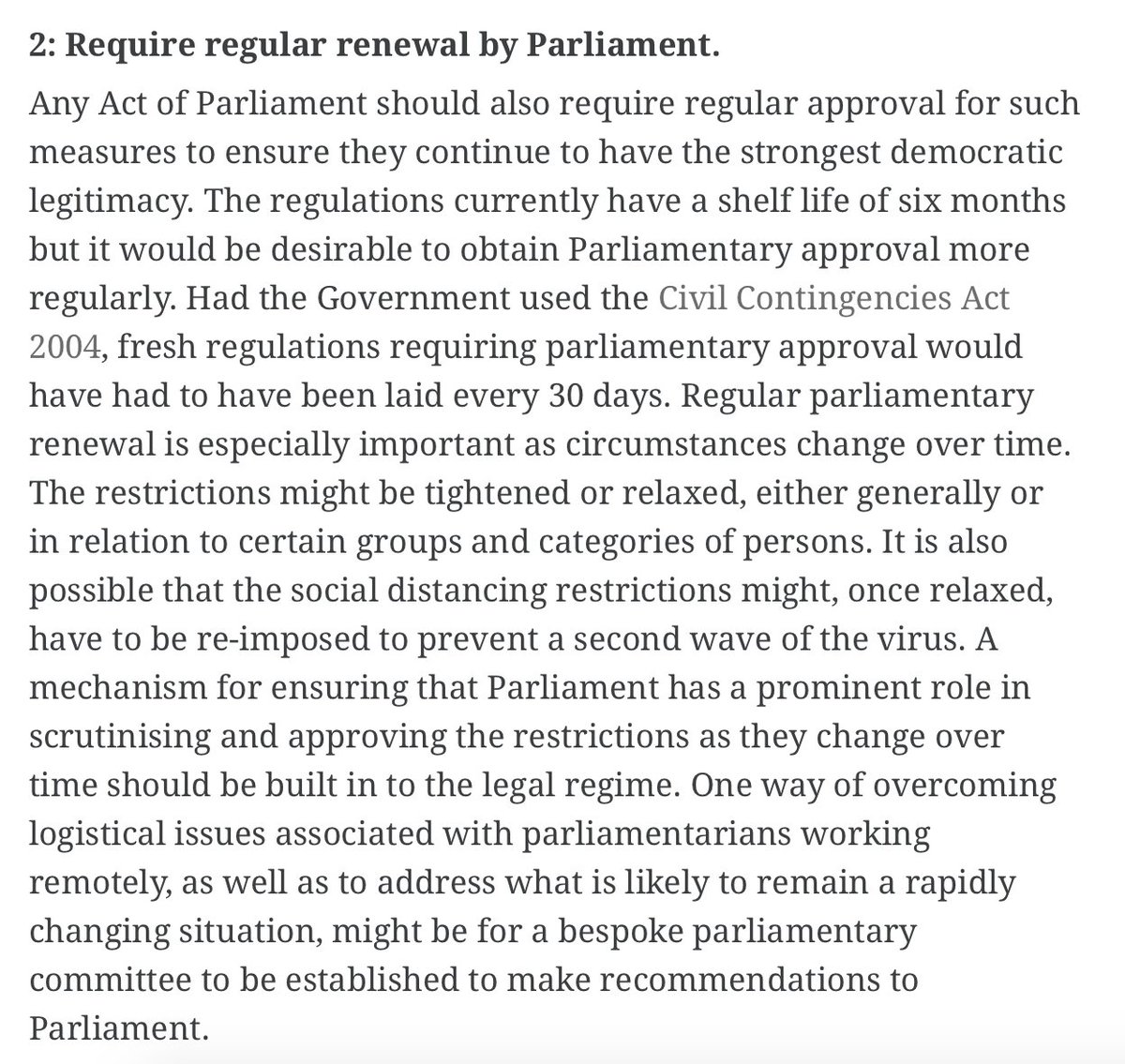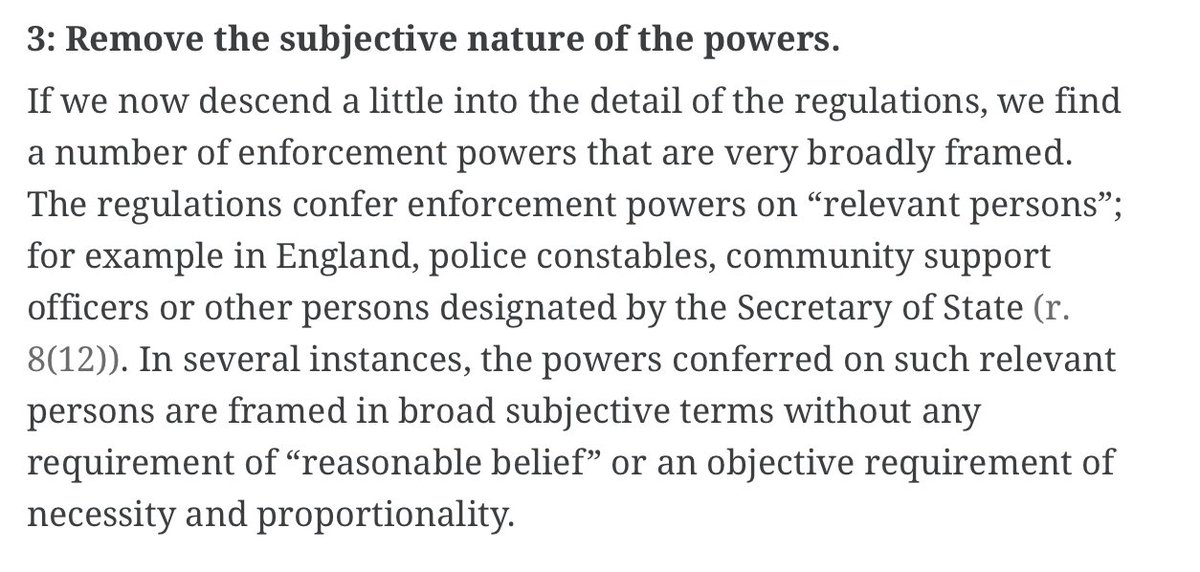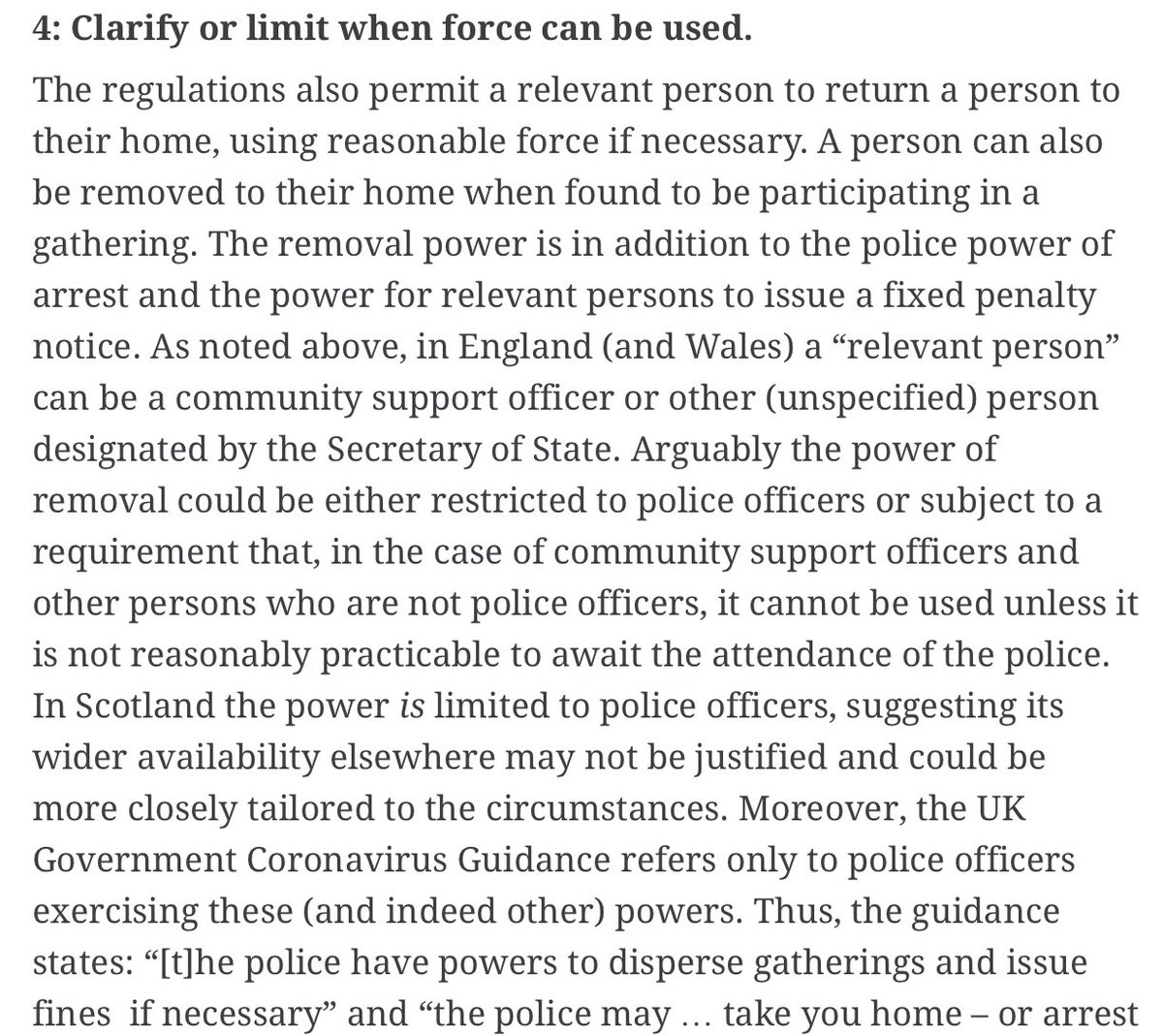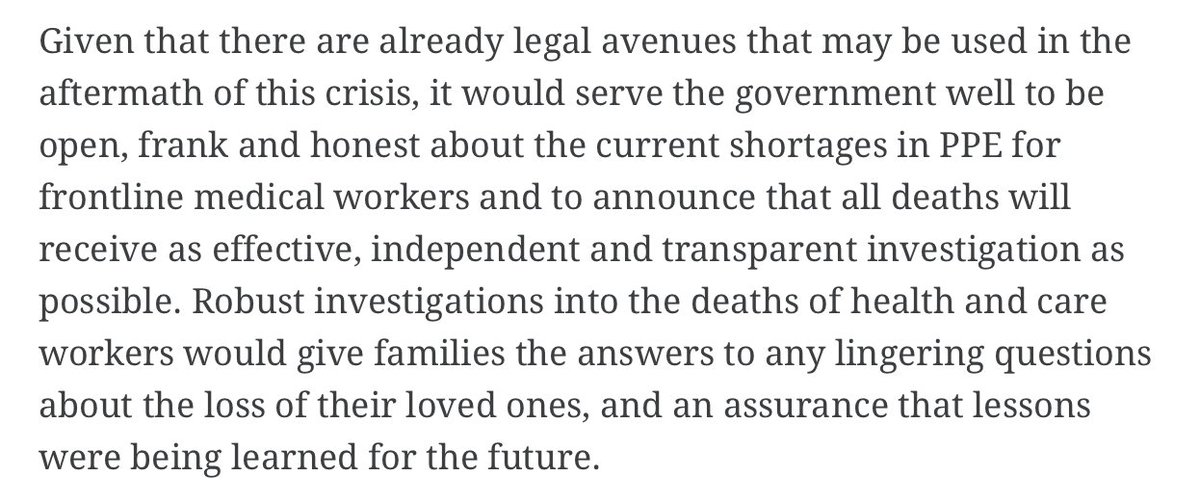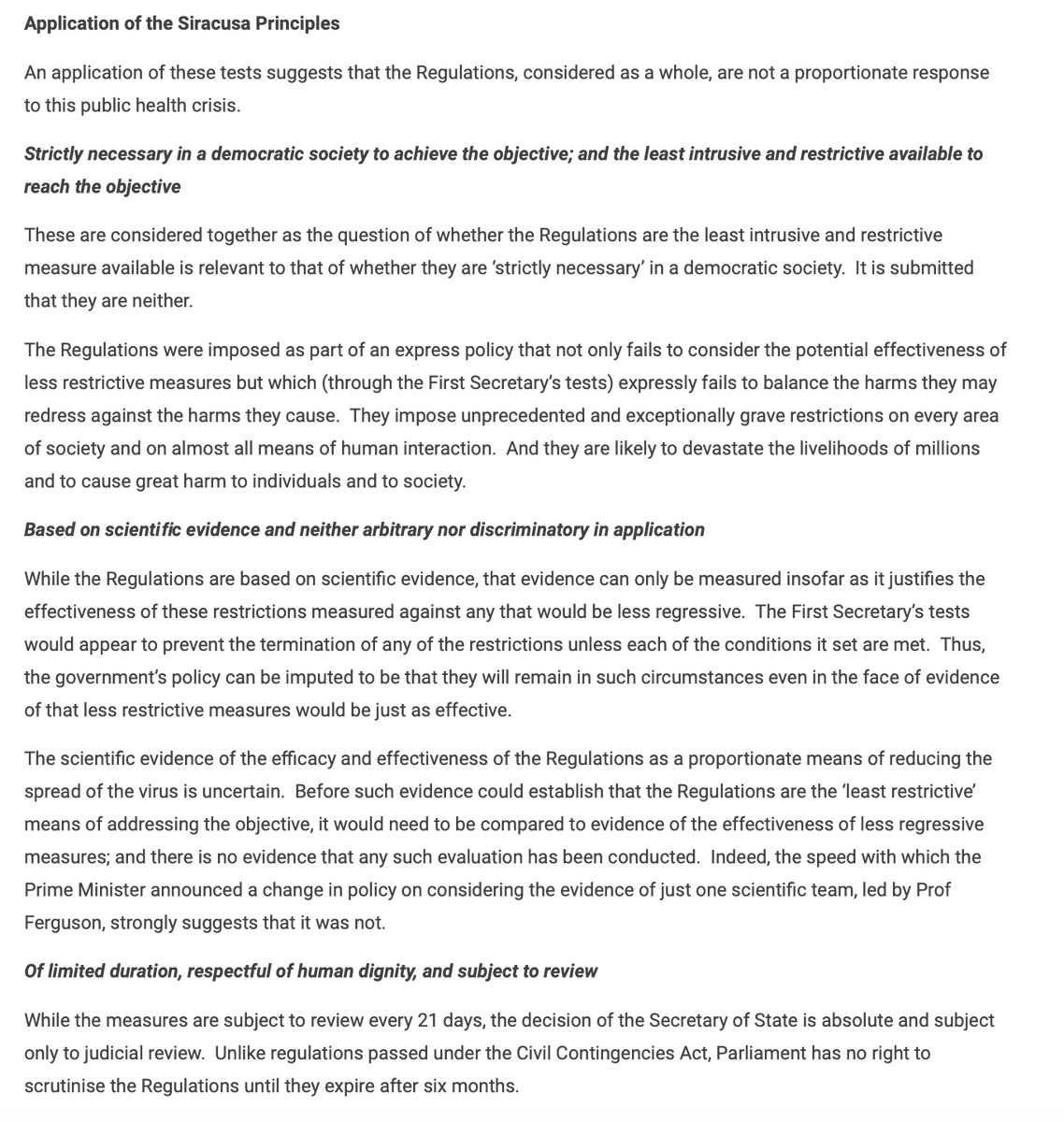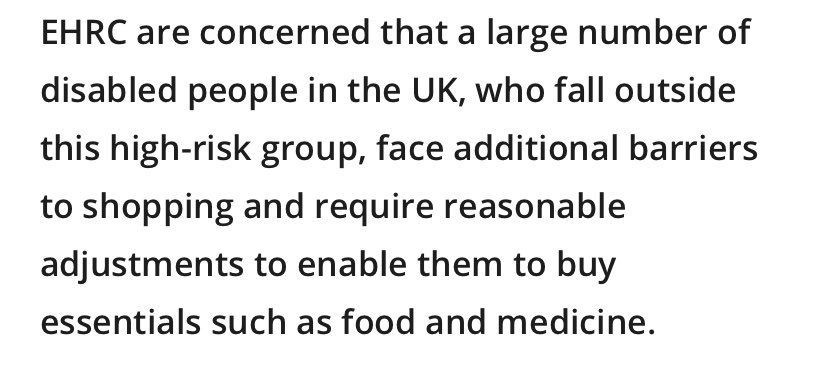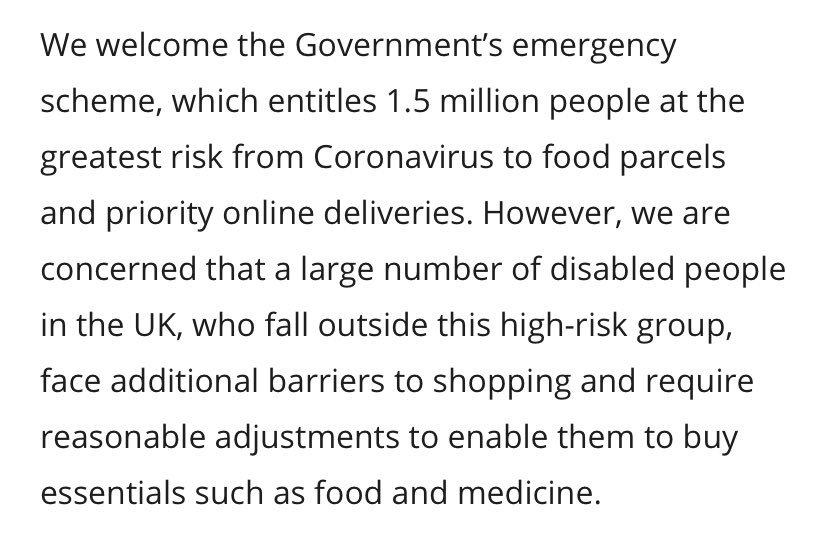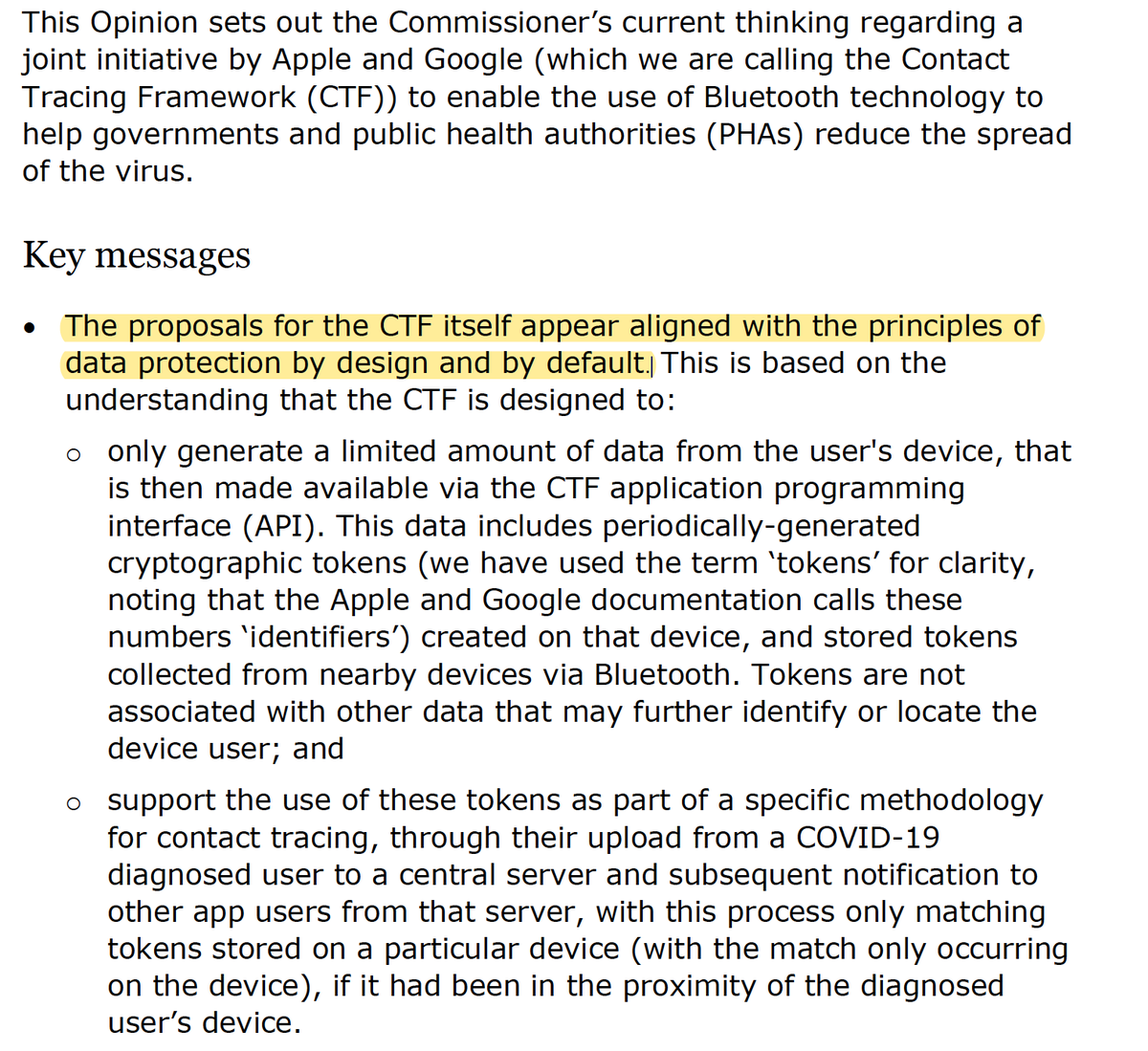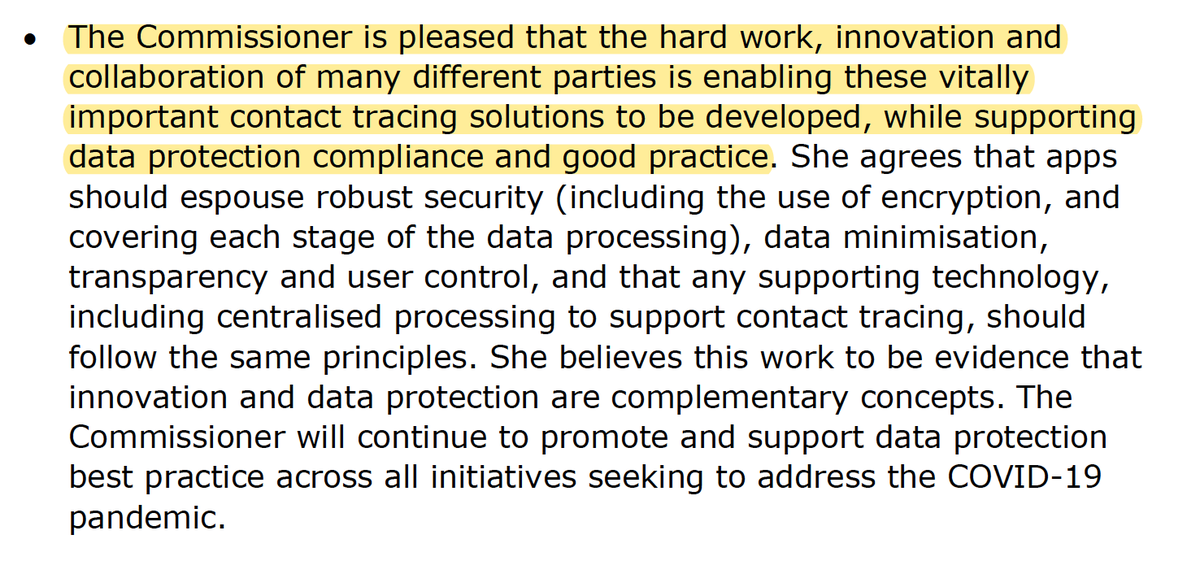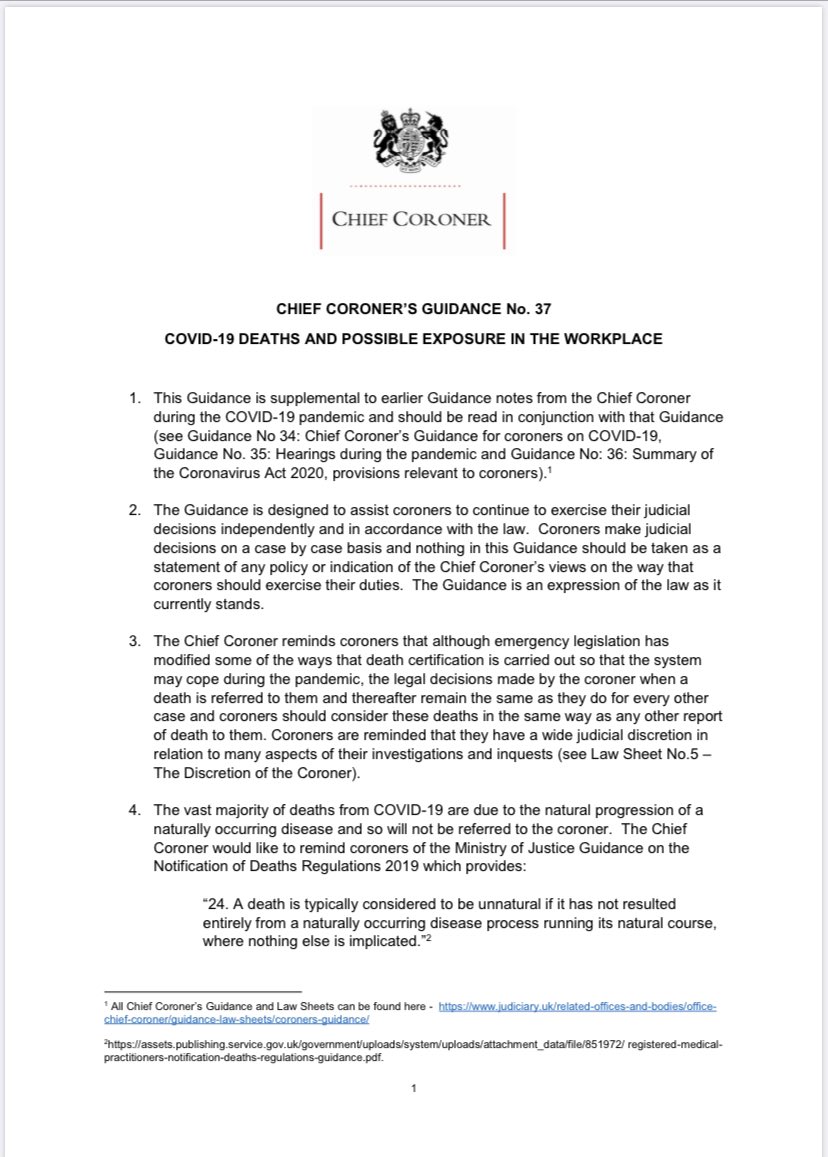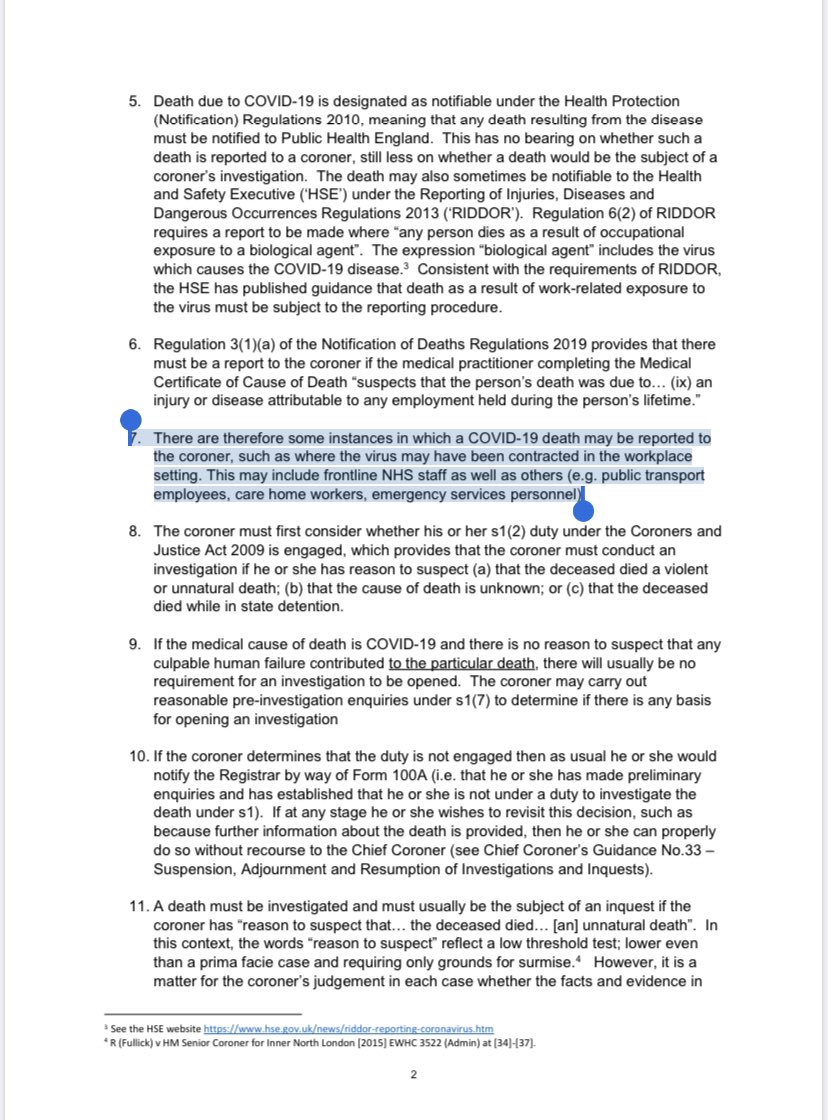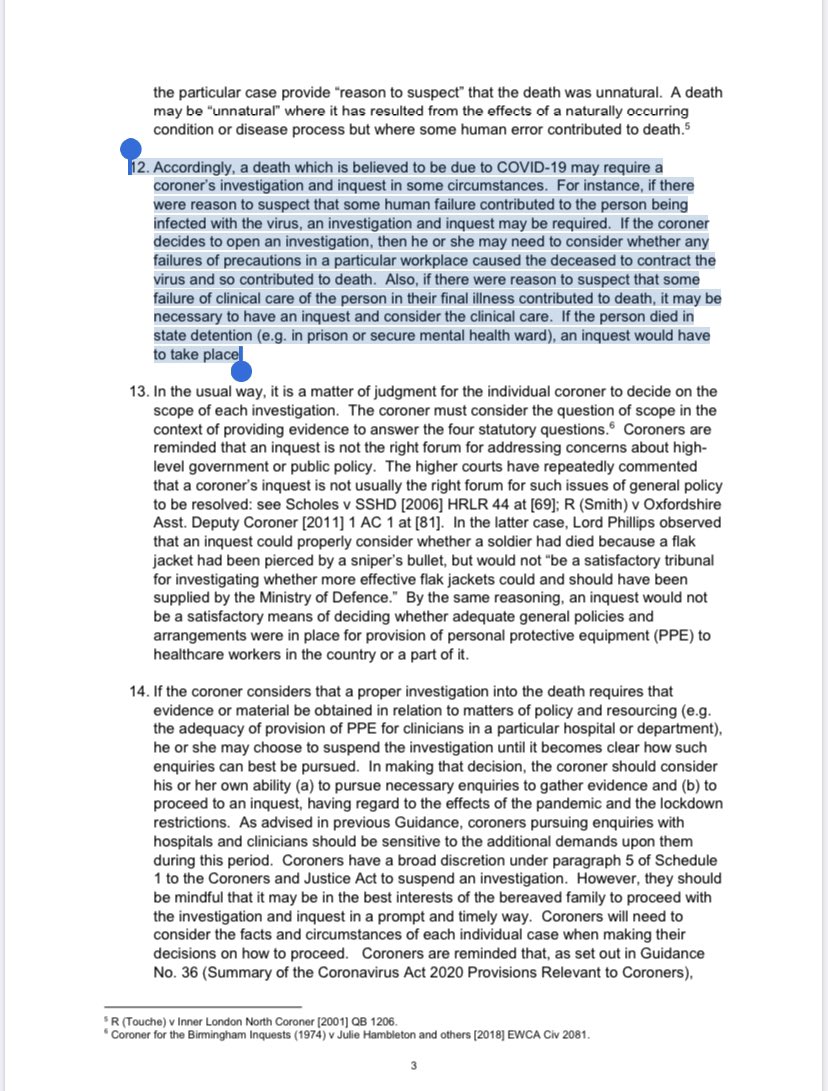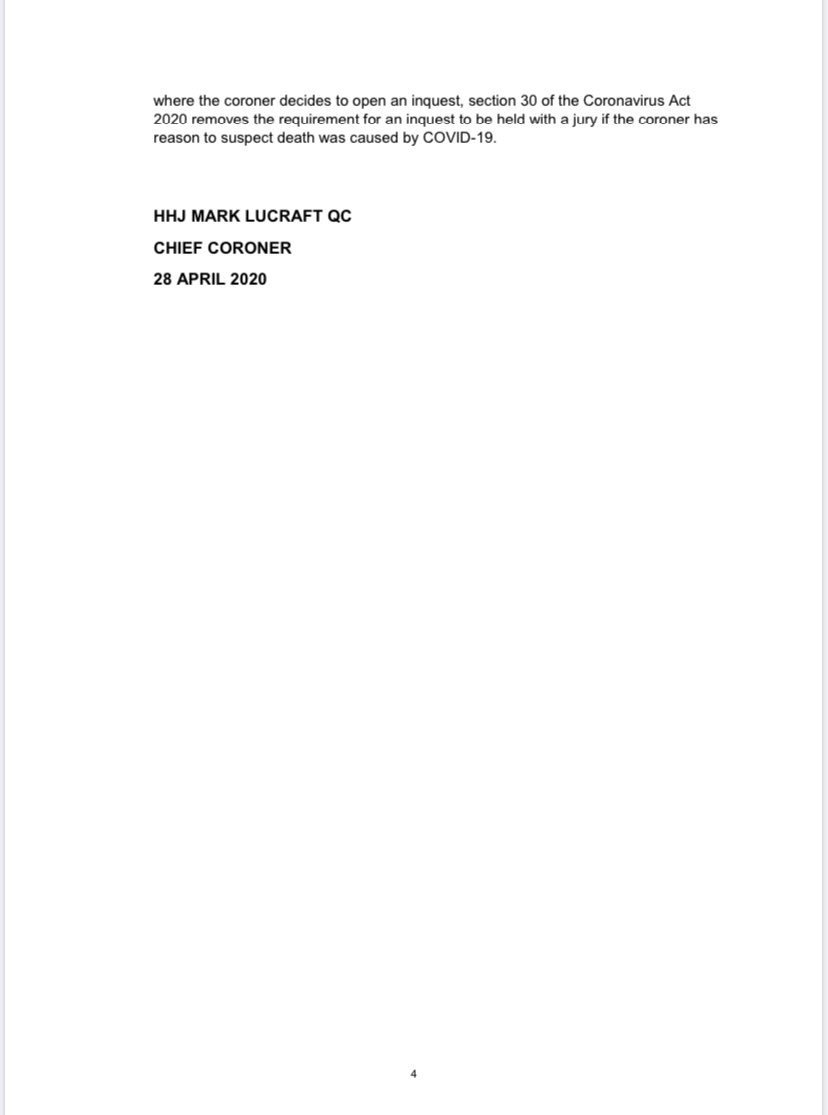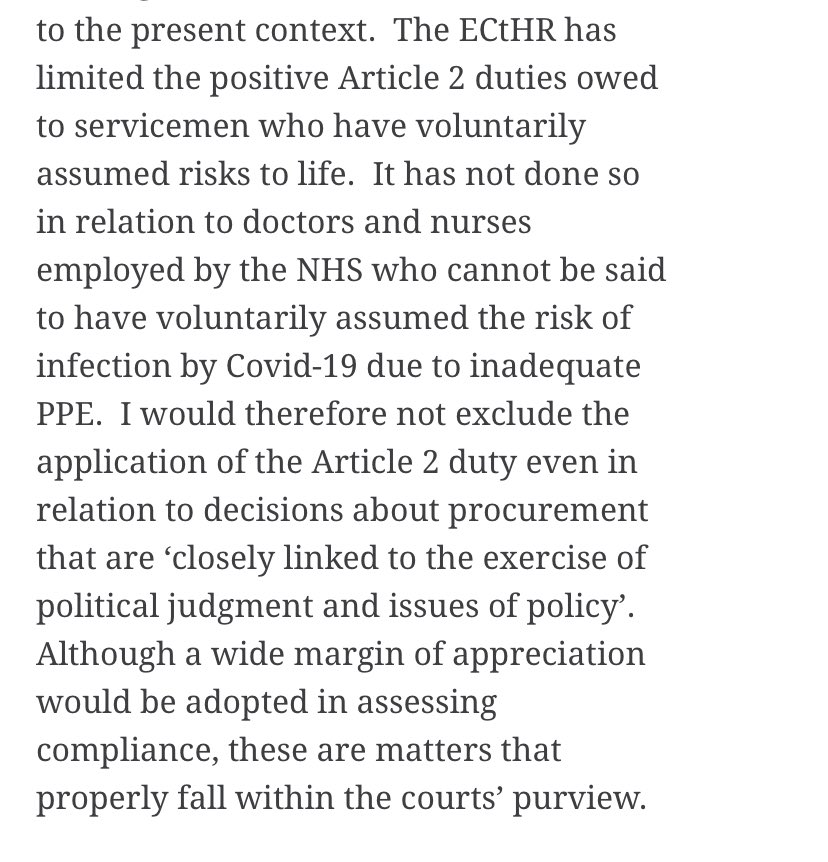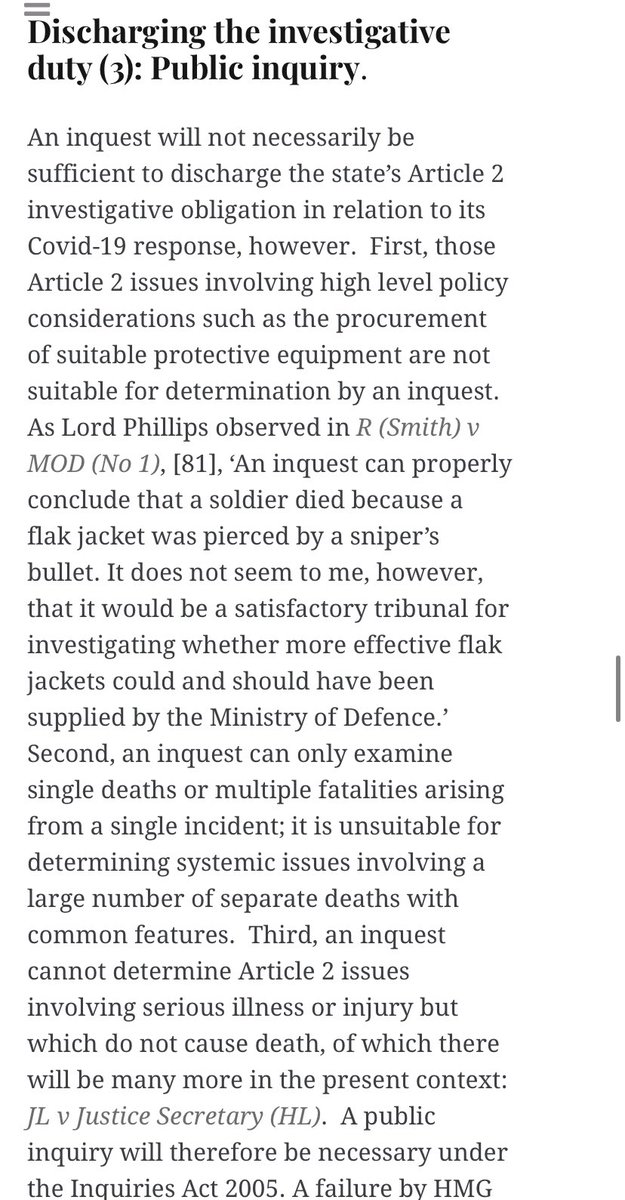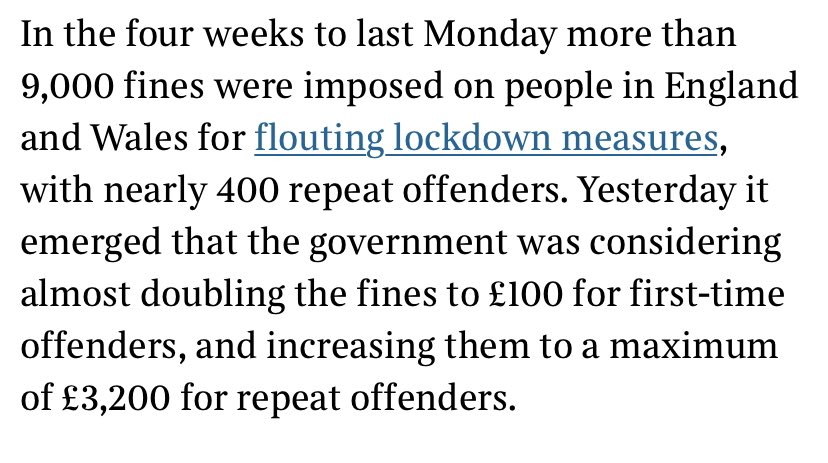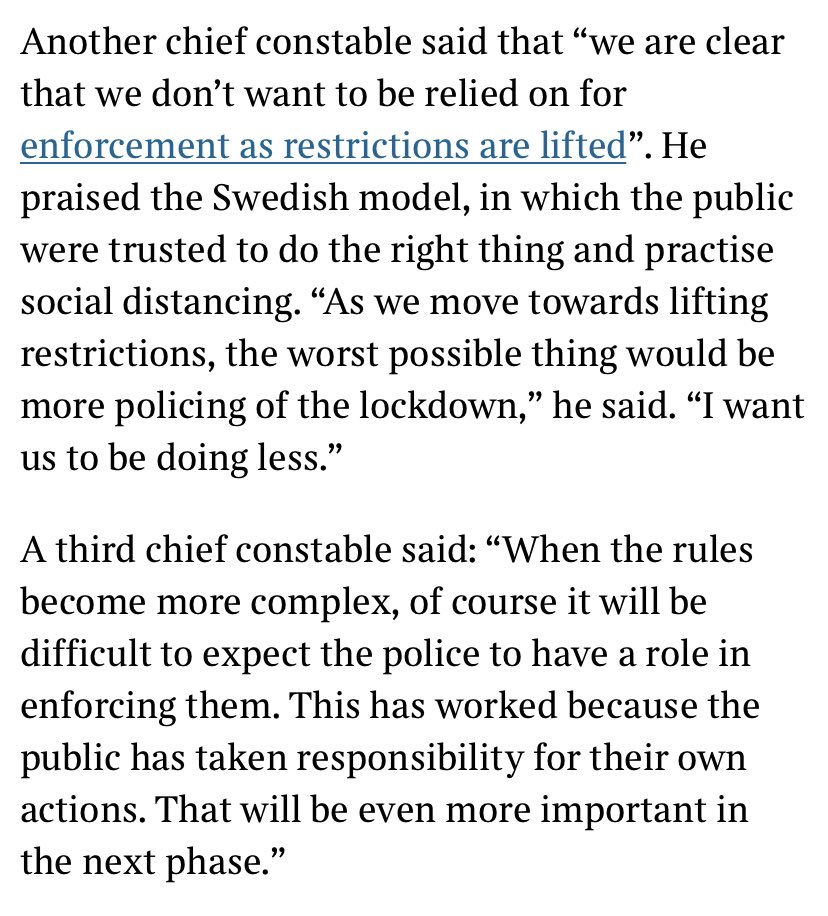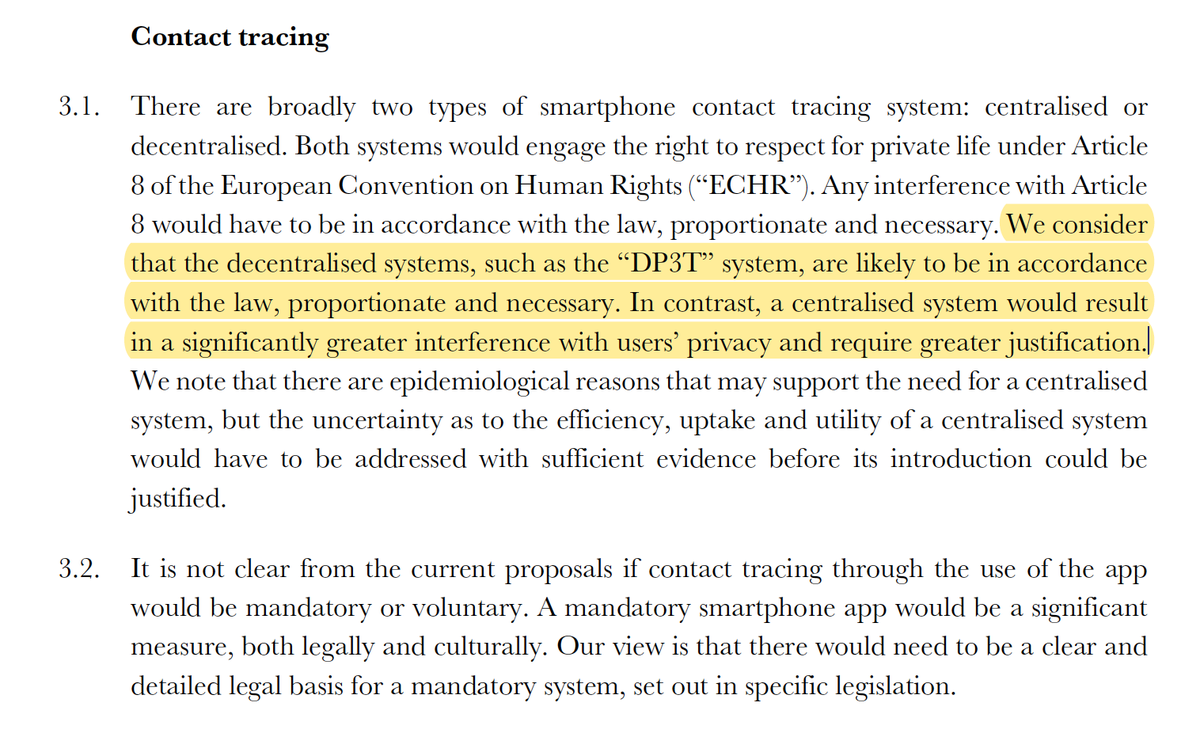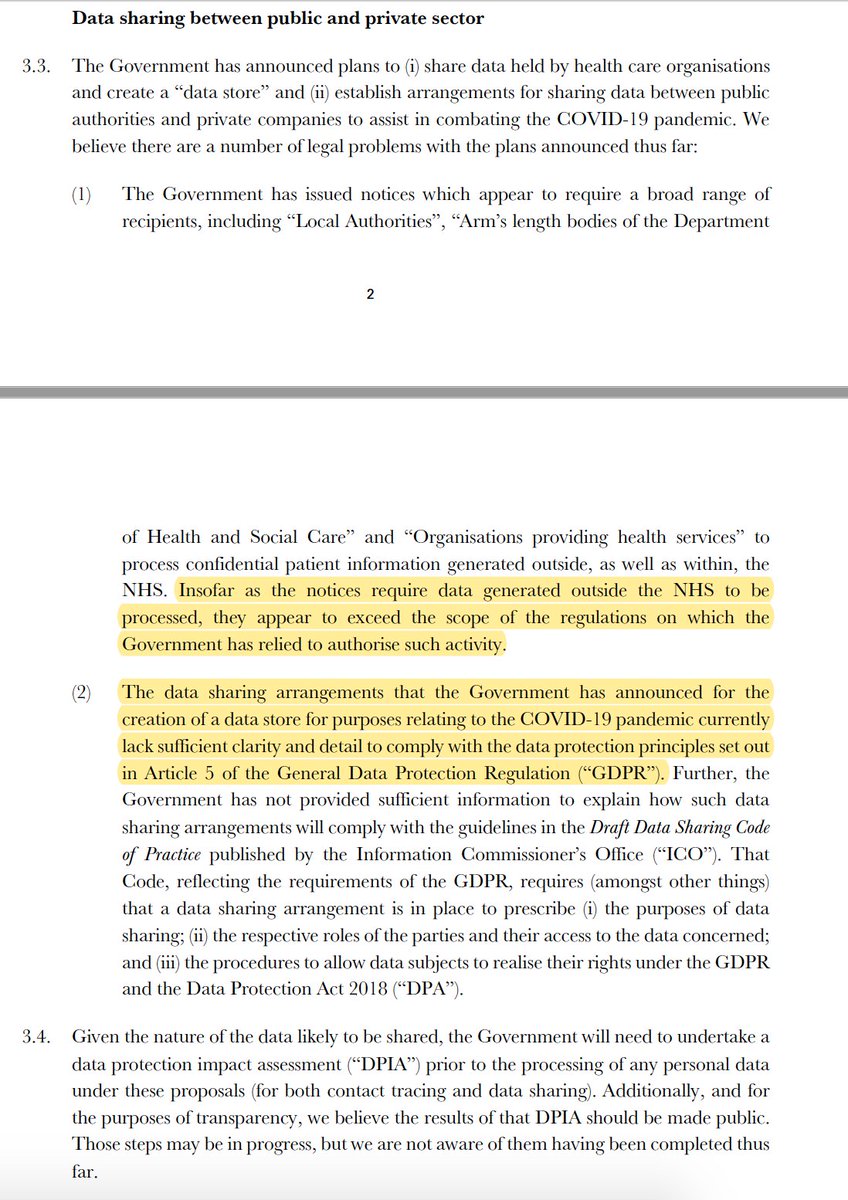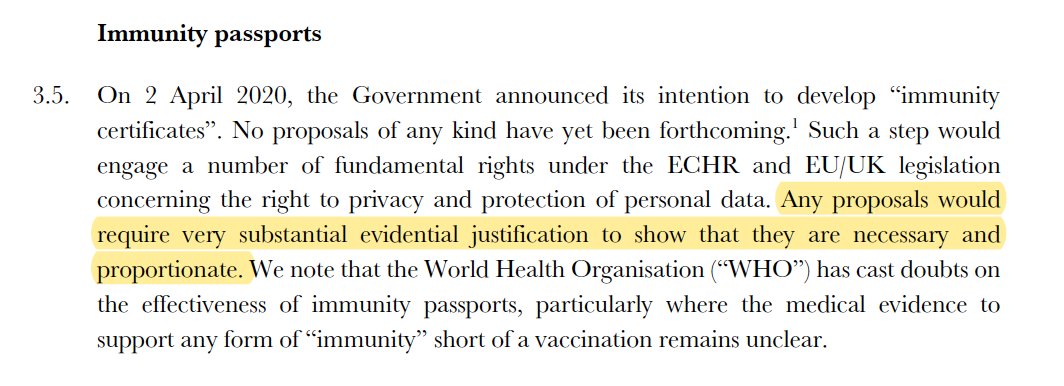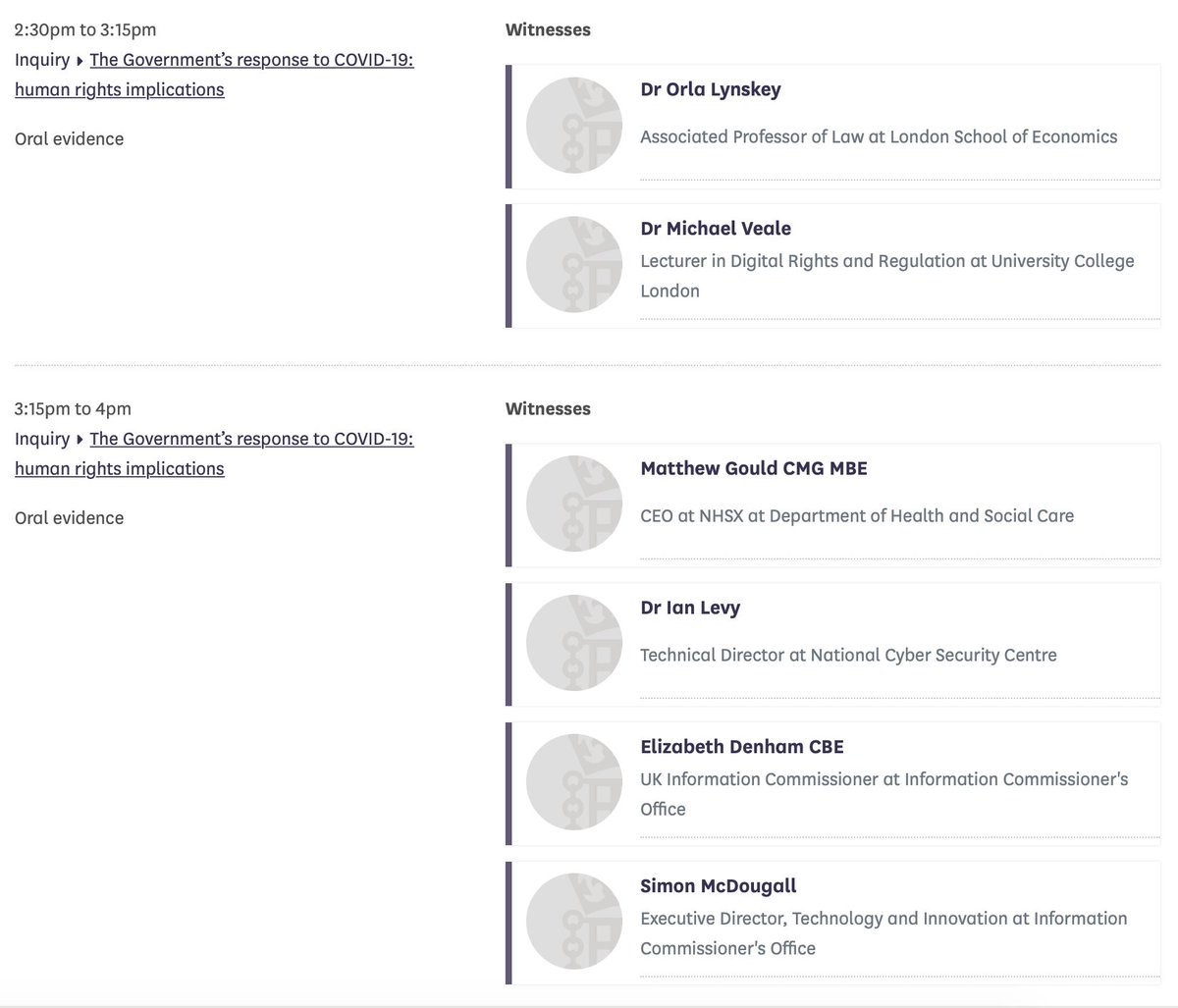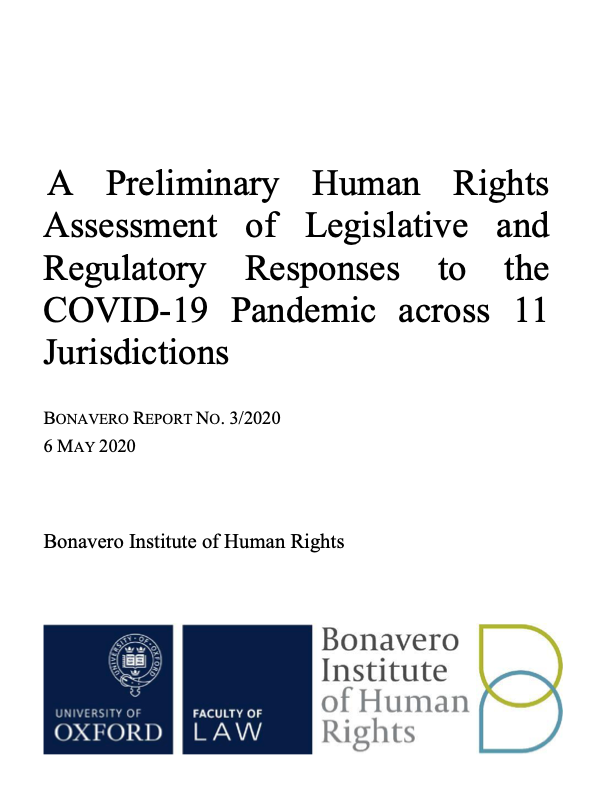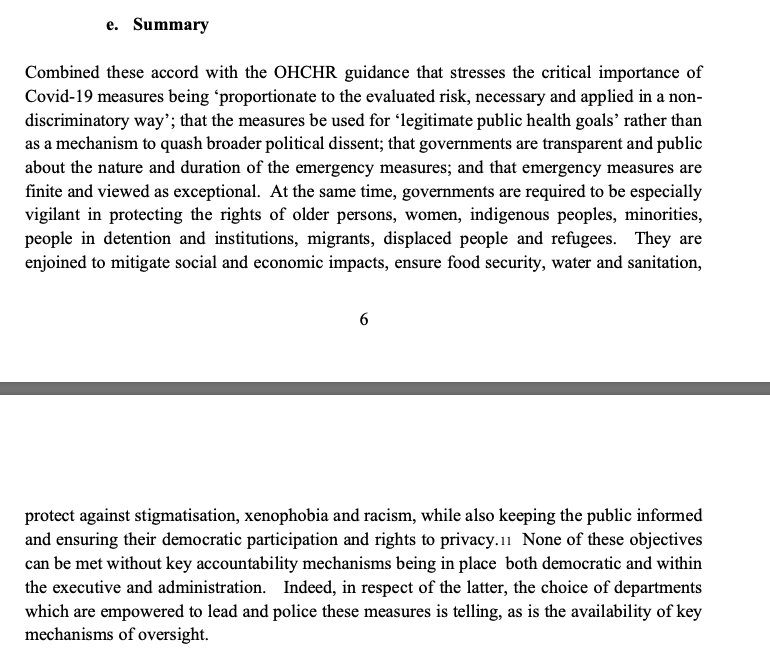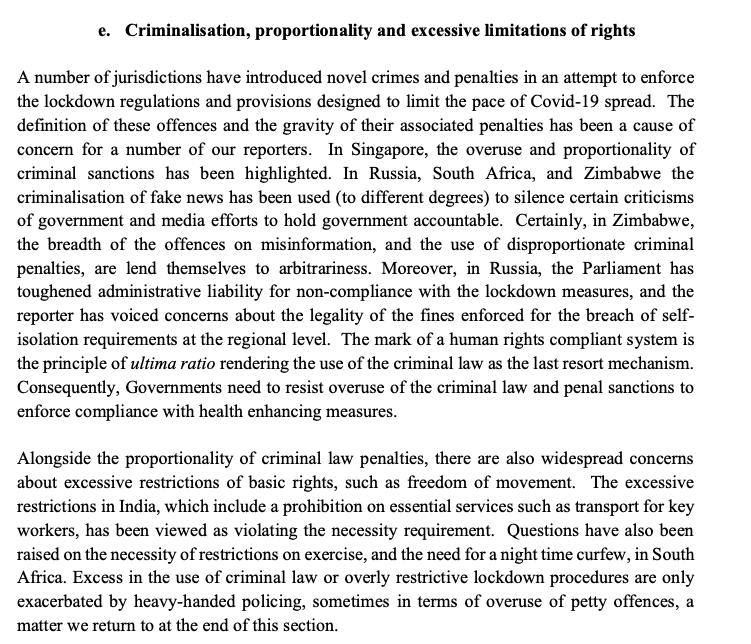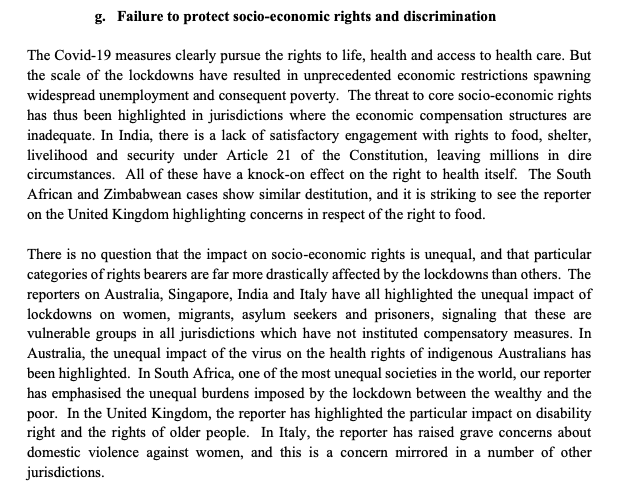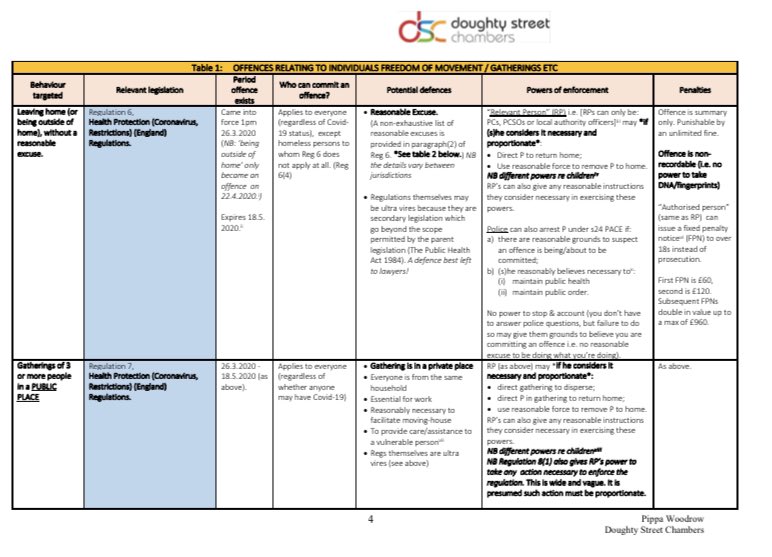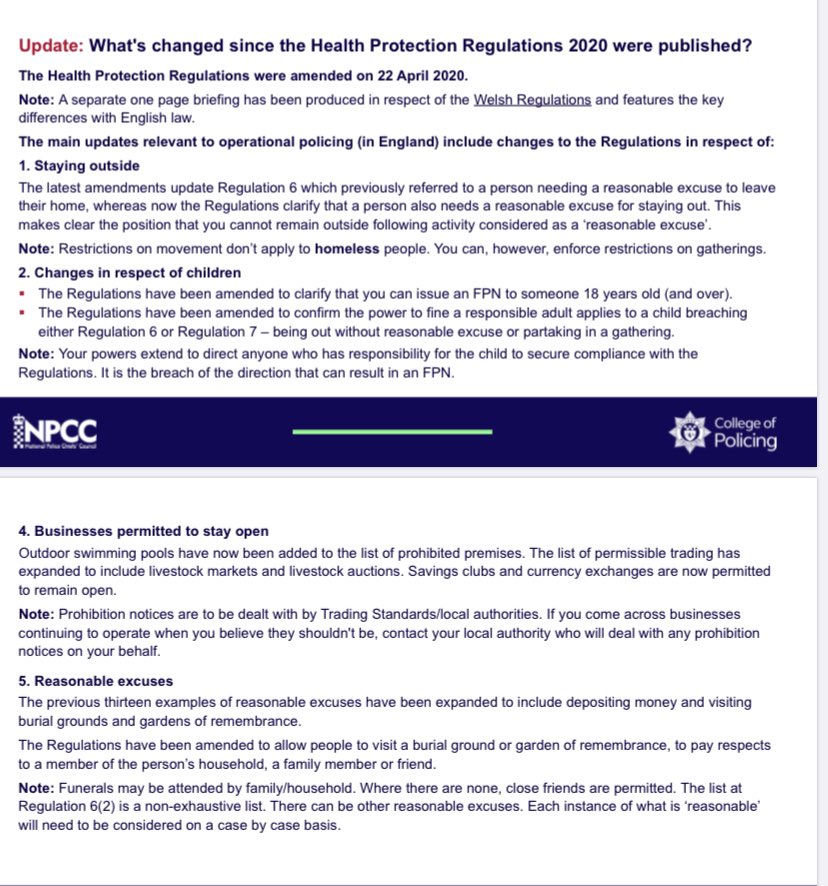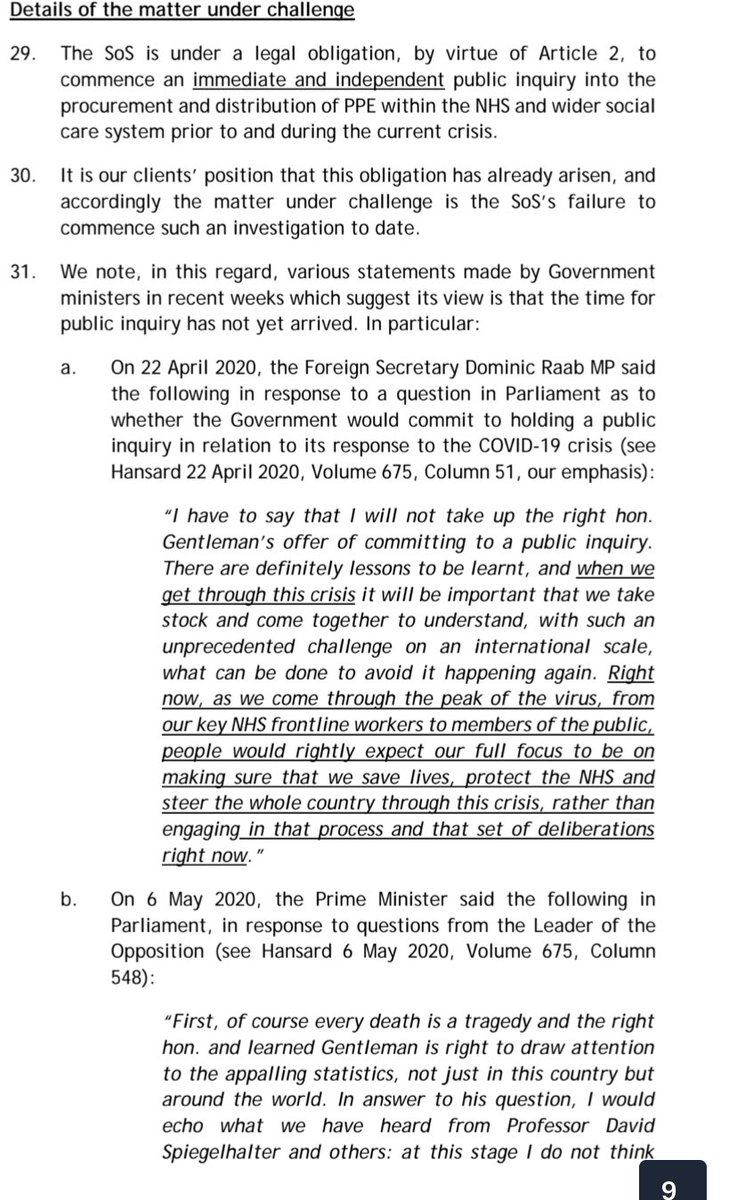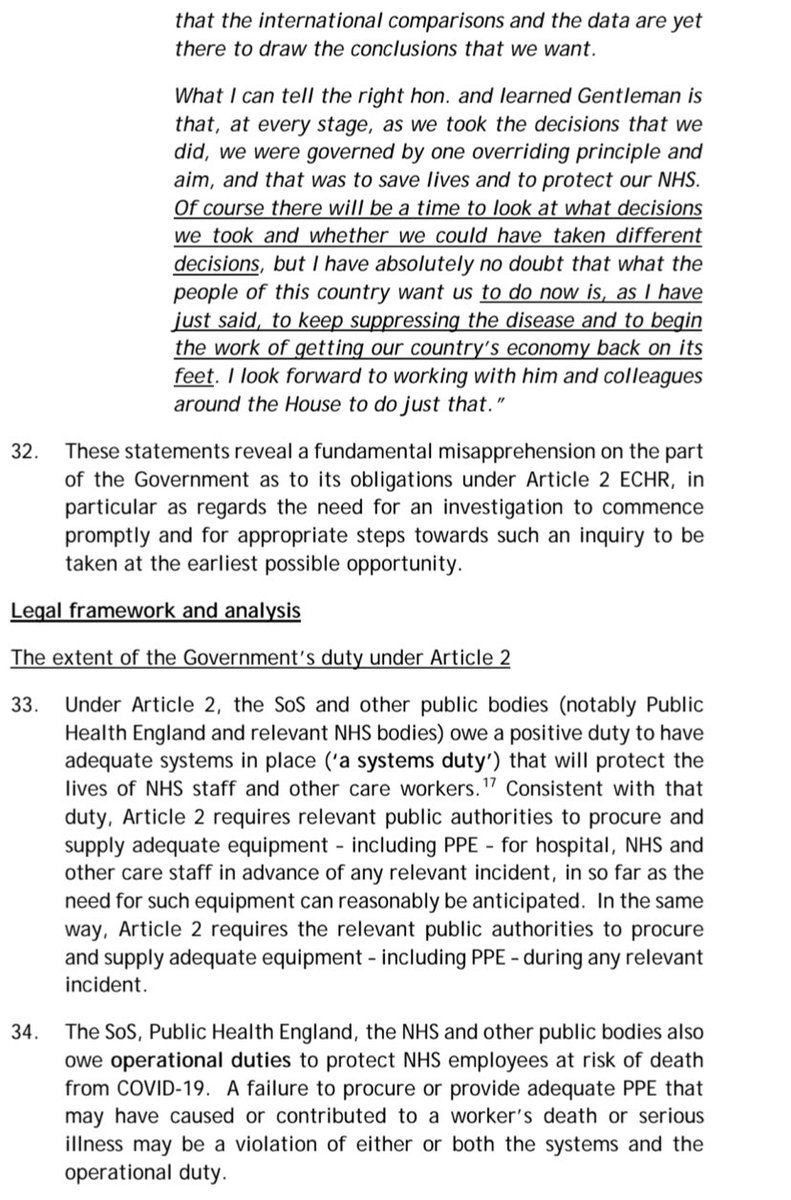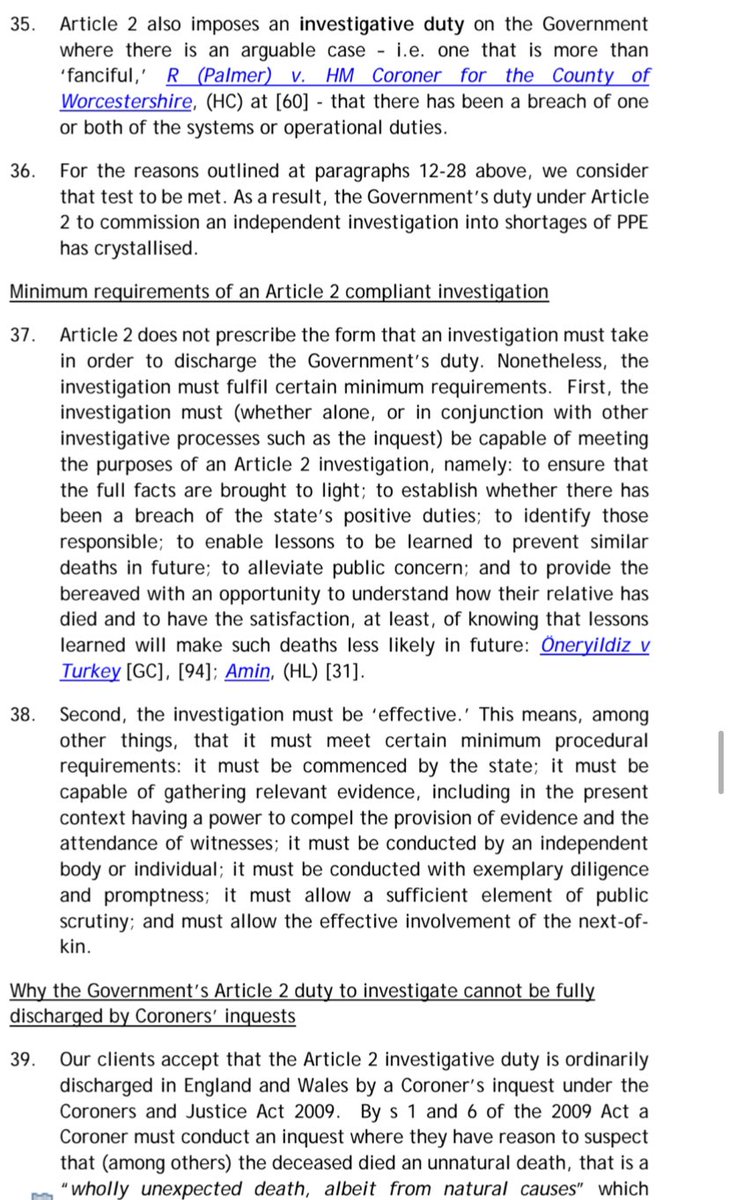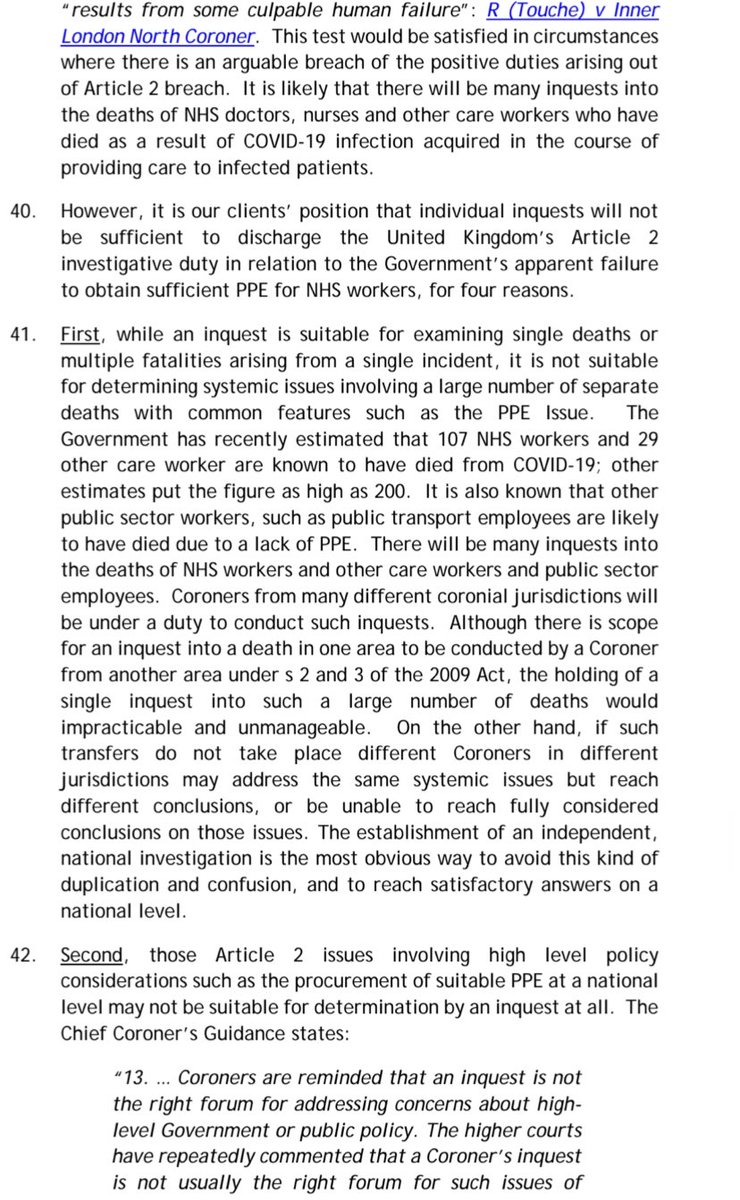This is a thread on human rights and the Coronavirus.
It will be a mixture of discussion, ideas and links and I will try to keep adding to it as things progress (THREAD)
It will be a mixture of discussion, ideas and links and I will try to keep adding to it as things progress (THREAD)
I have been thinking about how human rights values and laws can help us traverse the next few months of deep crisis - across the planet.
We could & #39;suspend& #39; or ignore human rights as a & #39;peace time nicety& #39; as has happened in the past.
But to do so would be a huge error /1
We could & #39;suspend& #39; or ignore human rights as a & #39;peace time nicety& #39; as has happened in the past.
But to do so would be a huge error /1
As a preliminary, it is really, really important to understand that looking at the potential response to Coronavirus through a human rights lens does not generate any easy answers. I’m not going to offer any. /2
Another preliminary: as with response to terrorism (there are similarities here) it is natural that when people are frightened, critical voices raising ‘niceties’ like individual rights are seen as annoying and beside the point. They. Are. Not. We know that from history. /3
What can human rights offer? Well, for one thing this is exactly the kind of crisis which the modern human rights system was designed for.
I’m going to start with the general and then move onto the specific /4
I’m going to start with the general and then move onto the specific /4
What are human rights for? In 1948, when the Universal Declaration of Human Rights was agreed upon, the world was reeling from decades of cataclysmic upheaval, including the ‘Spanish flu’ pandemic of 1918 which killed tens of millions, and WW1 and WW2 /5
The human rights framework emerged from a simple truth which had been amply evidenced - and this is it:
Societies under pressure tend of close in on themselves, people turn to strong men, people turn on each other /6
Societies under pressure tend of close in on themselves, people turn to strong men, people turn on each other /6
The idea of human rights was to build into societies a set of checks and balances which would, in principle, insure us against our worst natures - accepting (this is important) the simple truth that when crisis hits the *natural* instinct is to turn to illiberal measures. /7
Why are illiberal measures so damaging? Because they tend to trigger fear, panic and in history that has generally meant bad things for whatever group/s happen to be the scapegoat. /8
So the human rights idea is to build our institutions - government, courts, national culture - in a way which can respond to crises in a way which takes into account the basic rights of individuals - to life, liberty, free speech and so on /9
The response to Coronavirus is unique in some ways but also very familiar. Governments everywhere are having to make incredibly difficult decisions which involve, fundamentally, a balancing of rights - there are deep philosophical questions too /10
These are not new questions, they are about how the state makes almost impossible moral decisions. Do we protect the many or the few? How do we apportion scarce resources? When can certain rights and privileges be suspended? /11
As I said at the beginning, the human rights framework gives no easy answers. But one thing is crucial to understand: the right to life (Article 2 of the European Convention on Human Rights) is at the heart of human rights. Without it, there are no other rights! /12
And that means that there is a huge amount of leeway for states to protect life - even if it means temporarily suspending other rights. This idea is built into the European Convention itself, e.g. Article 5 allows detention to protect others from infectious disease /13
Now we get to the difficult bit. There is a huge amount of leeway for a state to protect us against a pandemic. But the difference between a state based on human rights and one which is not is that in the former that *leeway is not unlimited* /14
For example, however the UK government responds in the coming months, it must not torture people, treat them in an inhuman and degrading way, detain unless detention is necessary and proportionate or impose retrospective laws /15
To return to terrorism as an analogy - many of you will remember the fear and panic which spread after 9/11. It strained our liberal ideas. Some states (eg USA) brought back torture as a tactic. Others (e.g. China) have locked up millions of Uyghur Muslims for & #39;re-education& #39; /16
I would suggest that no state comes out clean from an era of crisis and panic. But a state with checks and balances, based on human rights principles (particularly the fundamental dignity of the individual) has a better chance of doing less damage /17
The Coronavirus epidemic neatly exposes the ultimate values of states. I am not able to comment on the relative merits of different strategies, I am not a scientist. But I do know that states like China are likely far more able to quarantine their entire population /18
China already has a hugely effective system of state surveillance. In Wuhan they were apparently using facial recognition to stop people leaving their blocks. They have the ability to control the spread of information through social media. /19
I have heard many people, here and in private, saying "well, at least China has & #39;got a grip& #39; on the situation". This is a classic case of & #39;we need a strong man to help us through this& #39;. A Jack Bauer character to dispense with the niceties /20
But, thankfully, we don& #39;t live in a society which has built up an infrastructure of control such that the quarantining of an entire population is possible. We live a quite different society. And our approach will have to be different as a result. On balance, this is good /21
I don& #39;t know where we will end. Nobody does. But as emergency laws are ratcheted up, and more extreme measures implemented, we need to critique the state response in a way which is both responsible and robust. People will say we are a nuisance. That& #39;s fine. That& #39;s democracy. /22
Let& #39;s get more specific. What does a & #39;responsible and robust& #39; human rights response look like?
First, ensuring emergency powers are properly scrutinised. By definition, emergency powers are & #39;legislate first, worry later& #39;. As an example, look at date of the 2020 emergency regs!
First, ensuring emergency powers are properly scrutinised. By definition, emergency powers are & #39;legislate first, worry later& #39;. As an example, look at date of the 2020 emergency regs!
There are new regulations coming down the path in the next week or two which will include far more draconian powers including of widespread detention. They need to be properly scrutinised, even if that means scrutiny at speed /24 https://metro.co.uk/2020/03/14/police-get-powers-detain-coronavirus-victims-sweeping-emergency-laws-12396630/">https://metro.co.uk/2020/03/1...
Second, because this is fundamentally a public health crisis (though not only one - because of panic buying, immigration controls, economic uncertainty) we should familiarise ourself with public health standards as a litmus test for new measures /25 https://twitter.com/BenjaminMMeier/status/1239158317139853313?s=20">https://twitter.com/BenjaminM...
This will become extremely important if e.g. care homes are quarantined and standards dropped as is being reported, and if people over 70 are quarantined. There will be huge side effects of these policies so each will have to be time limited and regularly reviewed /26
Third, we need to ensure that whatever draconian measures we temporarily consent to, as things progress these cannot become baked into our society. They must be time limited and the govt should be forced to renew them regularly /27
We must be able to return to our liberal institutions are quickly as possible once this crisis has dissipated. We must also remember that Johnson et al seem to have a natural inclination towards illiberal measures (e.g. prorogation) so they must be kept a careful eye on /28
Fourth, and this is a tough one, I am a strong believer that human rights laws only work if we have a human rights culture. And that comes from individuals living by human rights values. It means us all taking responsibility and modelling the way we want the state to behave /29
People who are running things are just regular humans like everybody else, with fears and flaws. We need to look after each other. Shop for quarantined people. Don’t panic buy. Small acts of kindness. As Eleanor Roosevelt said human rights begin in small places close to home /30
Fifth, the coming months will see very significant changes to our laws and society. Hopefully these will be temporary but it is crucial that the many individuals affected by quarantines etc are made aware of their rights and how they can access them /31
I don’t know exactly how this will play out. The possibilities are mind boggling, if eg there are millions of people forced to stay indoors (as opposed to being asked to do so which is v different). What rights do they have if the state is holding them in detention? /32
What about when health resources get scarce and the state has to made difficult decisions about how to distribute? Will there be courts open to challenge decisions as last resort? There are huge challenges ahead and if we don’t plan for it now things will be far worse /33
Sixth, we must demand, and the government grant, access to the full facts. This is so important. Liberal democracy only works if state decisions are rational and transparent. The system of mutual trust is instead of top down control (eg China) but it must be earned /44
Some good points about the duty to protect healthcare workers in this thread /45 https://twitter.com/estubbinsbates/status/1239257645112070144?s=20">https://twitter.com/estubbins...
In this new episode of @BHumanPodcast I discuss some of the issues in this thread with @newyorker’s @adamgopnik. Take a listen and let me know what you think /46 https://podcasts.apple.com/gb/podcast/better-human-podcast/id1481010283?i=1000468502475">https://podcasts.apple.com/gb/podcas...
Here is a really useful @ejiltalk discussion of whether the extensive Italian measures are compatible with human rights law. The conclusion @ale_spd reaches is that they are, because most rights can be limited to protect the public from an emergency /47 https://www.ejiltalk.org/do-the-containment-measures-taken-by-italy-in-relation-to-covid-19-comply-with-human-rights-law/">https://www.ejiltalk.org/do-the-co...
I think that the broad analysis is correct, especially if the measures are short term, but I think there is a more detailed view to take over the implementation of draconian measures, especially as time moves on and e.g. the sick and elderly stuck in flats begin to suffer /48
There are important questions of the state& #39;s positive obligations to e.g. protect health, protect health workers, educate children etc which will be increasingly relevant in the coming weeks /49
Some interesting coverage on @EachOtherUk which now has a Coronavirus section http://www.eachother.org.uk"> http://www.eachother.org.uk
See https://eachother.org.uk/how-covid-19-is-affecting-rights/">https://eachother.org.uk/how-covid... (general)
Risk of children going hungry if schools close https://eachother.org.uk/coronavirus-ensure-children-dont-go-hungry-schools-close/
Issues">https://eachother.org.uk/coronavir... if trials go video https://eachother.org.uk/coronavirus-access-to-justice-video-link/">https://eachother.org.uk/coronavir... /50
See https://eachother.org.uk/how-covid-19-is-affecting-rights/">https://eachother.org.uk/how-covid... (general)
Risk of children going hungry if schools close https://eachother.org.uk/coronavirus-ensure-children-dont-go-hungry-schools-close/
Issues">https://eachother.org.uk/coronavir... if trials go video https://eachother.org.uk/coronavirus-access-to-justice-video-link/">https://eachother.org.uk/coronavir... /50
European Court of Human Rights taking some sensible sounding measures:
 https://abs.twimg.com/emoji/v2/... draggable="false" alt="🦠" title="Microbe" aria-label="Emoji: Microbe">Imminent hearings cancelled
https://abs.twimg.com/emoji/v2/... draggable="false" alt="🦠" title="Microbe" aria-label="Emoji: Microbe">Imminent hearings cancelled
 https://abs.twimg.com/emoji/v2/... draggable="false" alt="🦠" title="Microbe" aria-label="Emoji: Microbe">"Rule 39" measures - urgent applications - will still be considered
https://abs.twimg.com/emoji/v2/... draggable="false" alt="🦠" title="Microbe" aria-label="Emoji: Microbe">"Rule 39" measures - urgent applications - will still be considered
 https://abs.twimg.com/emoji/v2/... draggable="false" alt="🦠" title="Microbe" aria-label="Emoji: Microbe">Time limits have been extended for 1 month
https://abs.twimg.com/emoji/v2/... draggable="false" alt="🦠" title="Microbe" aria-label="Emoji: Microbe">Time limits have been extended for 1 month
http://hudoc.echr.coe.int/eng-press?i=003-6666795-8866184">https://hudoc.echr.coe.int/eng-press... /51
http://hudoc.echr.coe.int/eng-press?i=003-6666795-8866184">https://hudoc.echr.coe.int/eng-press... /51
A forceful piece by my excellent colleague @JonathanCoopr arguing that the current government strategy is utilitarian not based on human rights principles https://www.opendemocracy.net/en/opendemocracyuk/will-johnsons-coronavirus-response-be-overthrown-eu-courts/">https://www.opendemocracy.net/en/opende... /52
A well-pitched piece by @CommissionerHR - extreme measures are necessary but must also be proportionate and properly consider human rights https://www.coe.int/en/web/commissioner/-/we-must-respect-human-rights-and-stand-united-against-the-coronavirus-pandemic">https://www.coe.int/en/web/co...
Another key human rights issue in the coming months will be the enhanced & #39;article 2& #39; (right to life) inquests (investigations) into deaths caused by Coronavirus. Any death where there is arguable state complicity must be examined in detail by a coroner /54 https://twitter.com/SimonFRCox/status/1239697124301946882?s=20">https://twitter.com/SimonFRCo...
This will be a hugely complex process as if there are hundreds or thousands of deaths caused by coronavirus, human rights law means there must be a full investigation by the state into any systemic failings which more than minimally contributed to the death /55
Although it is possible that coroners all over the UK will carry out this work separately, I imagine that the logical way to satisfy the Article 2 investigative duty will be to amalgamate those inquests into a single inquest (like Hillsborough) or a public inquiry - in time /56
However, if this crisis lasts more than a few months then inquests will need to take place to ensure any failings (e.g. in primary care or overall systemic response) are learned from so that they don& #39;t reoccur. Hugely complex given the difficulty in holding jury inquests /57
My goodness, here is a summary of the contents of the vast new bill to address the issues likely to arise over Coronavirus. It is huge - really significant changes to (and increases of) state power https://www.gov.uk/government/publications/coronavirus-bill-what-it-will-do/what-the-coronavirus-bill-will-do">https://www.gov.uk/governmen... /58
Rather than doing this in the thread, I have uploaded a version of the government introduction to the coronavirus bill with comments by me - some of the comments are quite long so you need to click them to read. Please reply with comments to this tweet /59 https://docs.google.com/document/d/1GljD8lHQDOiy5DJu1Qcrxl8ZQbfM6MCsL-TvjOz17_g/edit?usp=sharing">https://docs.google.com/document/...
This is an excellent thread by @davidallengreen on the issues of the huge expansion of state power in the proposed coronavirus bill. This chimes with his longstanding campaign to avoid unnecessary legislation and the warnings are important ones /60 https://twitter.com/davidallengreen/status/1240226362415349761?s=20">https://twitter.com/davidalle...
Another important human rights issue and one which will be mostly ignored. There are currently about 2,000 people in immigration dentition - there is no reason to keep them there. /61 https://twitter.com/AdamWagner1/status/1240305981436973058?s=20">https://twitter.com/AdamWagne...
This is the first detailed human rights analysis of the worldwide Coronavirus crisis I have read - from @hrw. It’s superb. Considers the various potential issues and dives into the detail https://www.hrw.org/news/2020/03/19/human-rights-dimensions-covid-19-response">https://www.hrw.org/news/2020... /62
The Legal Education Foundation& #39;s @NatalieByrom has produced a really useful report on how to maintain the rule of law during the Covid 19 crisis. Some helpful recommendations too …https://research.thelegaleducationfoundation.org/wp-content/uploads/2020/03/Recommendations-for-Coronavirus-Bill_V6.pdf">https://research.thelegaleducationfoundation.org/wp-conten... /63
Another human rights implication of #Coronavirus is the mischief that happens whilst everyone is focusing on the  https://abs.twimg.com/emoji/v2/... draggable="false" alt="🦠" title="Microbe" aria-label="Emoji: Microbe"> - yesterday govt published its Overseas Operations Bill making it much harder to prosecute soldiers for bad things which happen overseas /64 https://www.gov.uk/government/publications/overseas-operations-service-personnel-and-veterans-bill">https://www.gov.uk/governmen...
https://abs.twimg.com/emoji/v2/... draggable="false" alt="🦠" title="Microbe" aria-label="Emoji: Microbe"> - yesterday govt published its Overseas Operations Bill making it much harder to prosecute soldiers for bad things which happen overseas /64 https://www.gov.uk/government/publications/overseas-operations-service-personnel-and-veterans-bill">https://www.gov.uk/governmen...
In a nutshell, only in & #39;exceptional circumstances& #39; will prosecutions be brought for stuff that happened overseas involving the armed forces 5 years or more ago. And Human Rights Act civil claims will be harder after 1 year and impossible after 6 years /65 https://www.gov.uk/government/publications/overseas-operations-service-personnel-and-veterans-bill">https://www.gov.uk/governmen...
This is a really simple idea but such a good cause https://twitter.com/jem_stein/status/1240592936309600256?s=20">https://twitter.com/jem_stein... /66
Some personal news and also an important call for evidence from the Joint Committee on Human Rights https://twitter.com/AdamWagner1/status/1240599095405879298?s=20">https://twitter.com/AdamWagne... /67
Here is the full Coronavirus Bill, just published. Is the human rights compatilibity statement on the front page accuate? Time will tell... /68 https://publications.parliament.uk/pa/bills/cbill/58-01/0122/20122.pdf">https://publications.parliament.uk/pa/bills/...
Really useful #Coronavirus employment law and other guidance from barristers& #39; (lawyers) chambers @11kbw - bookmark this page https://www.11kbw.com/knowledge-events/news/practical-information-and-guidance-on-the-impact-of-covid-19-on-our-practice-areas/">https://www.11kbw.com/knowledge... (ht @seanjonesqc) /69
Some more excellent stuff from @eachotherUK http://www.eachother.org.uk"> http://www.eachother.org.uk
What happens to prisoners? Great question https://eachother.org.uk/coronavirus-what-happens-to-prisoners/
How">https://eachother.org.uk/coronavir... can I protect vulnerable people (this relates to my point above about the small places) https://eachother.org.uk/coronavirus-how-can-i-protect-the-vulnerable/">https://eachother.org.uk/coronavir... /70
What happens to prisoners? Great question https://eachother.org.uk/coronavirus-what-happens-to-prisoners/
How">https://eachother.org.uk/coronavir... can I protect vulnerable people (this relates to my point above about the small places) https://eachother.org.uk/coronavirus-how-can-i-protect-the-vulnerable/">https://eachother.org.uk/coronavir... /70
Some really useful comments on the social care parts of the coronavirus bill from my @DoughtyStreet colleague @JamieBurton29 https://twitter.com/JamieBurton29/status/1240781533713182723?s=20">https://twitter.com/JamieBurt... /71
If you& #39;re looking for coronavirus bill documents:
Summary https://www.gov.uk/government/publications/coronavirus-bill-what-it-will-do/what-the-coronavirus-bill-will-do
Bill">https://www.gov.uk/governmen... https://publications.parliament.uk/pa/bills/cbill/58-01/0122/20122.pdf
Explanatory">https://publications.parliament.uk/pa/bills/... notes https://publications.parliament.uk/pa/bills/cbill/58-01/0122/en/20122en.pdf
Summary">https://publications.parliament.uk/pa/bills/... of impacts https://www.gov.uk/government/publications/coronavirus-bill-summary-of-impacts
It& #39;s">https://www.gov.uk/governmen... an overwhelming amount. Unlikely any MP will be able to read it all by Mon /72
Summary https://www.gov.uk/government/publications/coronavirus-bill-what-it-will-do/what-the-coronavirus-bill-will-do
Bill">https://www.gov.uk/governmen... https://publications.parliament.uk/pa/bills/cbill/58-01/0122/20122.pdf
Explanatory">https://publications.parliament.uk/pa/bills/... notes https://publications.parliament.uk/pa/bills/cbill/58-01/0122/en/20122en.pdf
Summary">https://publications.parliament.uk/pa/bills/... of impacts https://www.gov.uk/government/publications/coronavirus-bill-summary-of-impacts
It& #39;s">https://www.gov.uk/governmen... an overwhelming amount. Unlikely any MP will be able to read it all by Mon /72
Just out - I recorded a @BHumanPodcast 2-part special yesterday with four superb human rights experts. You can listen to Part 1 here #episodeGuid=https%3A%2F%2Fanchor.fm%2Fbetter-human%2Fepisodes%2F16---Coronavirus-and-human-rights-special-episode-Part-12-ebopmk">https://podcasts.apple.com/gb/podcast/better-human-podcast/id1481010283 #episodeGuid=https%3A%2F%2Fanchor.fm%2Fbetter-human%2Fepisodes%2F16---Coronavirus-and-human-rights-special-episode-Part-12-ebopmk">https://podcasts.apple.com/gb/podcas... /73
Important new guidelines on quarantine and Covid-19 from the @COE’s Committee for the Prevention of Torture and Inhuman or Degrading Treatment or Punishment /74 https://www.coe.int/en/web/cpt/-/covid-19-council-of-europe-anti-torture-committee-issues-statement-of-principles-relating-to-the-treatment-of-persons-deprived-of-their-liberty-">https://www.coe.int/en/web/cp...
Part 2 of the @BHumanPodcast special episode just posted - with commentary on the Coronavirus Bill which is being debated today (and only today!) in the House of Commons https://podcasts.apple.com/gb/podcast/17-coronavirus-and-human-rights-special-part-2-2/id1481010283?i=1000469209152">https://podcasts.apple.com/gb/podcas... /75
BBC reporting government will add an amendment to the Coronavirus Bill that it must be "reviewed" after six months. Provisional welcome to this (2 years+ is far too long) but devil will be in the detail of what review will encompass and whether it has to be renewed by vote /76
Really useful summary of the key parts of the Coronavirus Bill from @EachOtherUk. This bill is HUGE. Each part worth months of debate https://eachother.org.uk/what-you-need-to-know-about-the-coronavirus-bill/">https://eachother.org.uk/what-you-... /77
A sensible thread. Beware The Clamour for more police involvement (and I don& #39;t think David is arguing for no police involvement, but rather that we don& #39;t see it as a panacea) https://twitter.com/davidallengreen/status/1242125040138752012?s=20">https://twitter.com/davidalle... /78
Lots of interesting discussion from lawyers in my TL (see previous tweets) on how police will have power to enforce new curfew rules, e.g. fining people for leaving house. Appears that (a) no power yet exists (b) will need new regs perhaps even amendment to Coronavirus Bill /79
This isn& #39;t about legal pedantry - it& #39;s about ensuring that the police are exercising powers which are clear and accessible, both for them and citizens, and everyone understands the limits of them. Would have thought govt would have had this in place already /80
Important to remember that these are unprecedentedly wide powers - ?expect perhaps during WW2 (reminds me of my grandfather& #39;s stories of sneaking out of base to see his family and being caught by constable without having reasonable excuse). So need careful thought. /81
It sounds like this is all happening on the hoof, and we can& #39;t blame the government for the speed of the crisis, though on the other hand it has been apparent that these restrictions would probably be needed for a number of weeks so should really have had ducks in row /82
My best guess is powers will come through emergency regulations under Civil Contingencies Act. But they need to be carefully thought through. How will police know if someone has broken rules? What defences will there be? We aren& #39;t filling in forms like French so what proof? /83
A few more thoughts in this thread. Also possibility that the powers will come through Public Health (Control of Diseases) Act 1984 https://twitter.com/AdamWagner1/status/1242203596764188672?s=20">https://twitter.com/AdamWagne... /84
Very useful post on some of the concerning constitutional implications of the Coronavirus Bill https://ukconstitutionallaw.org/2020/03/24/stephen-tierney-and-jeff-king-the-coronavirus-bill/">https://ukconstitutionallaw.org/2020/03/2... /85
Lord Sumption (former Supreme Court Justice) raises similar concerns as I did in the thread above in The Times this morning
https://www.thetimes.co.uk/article/there-is-a-difference-between-the-law-and-official-instructions-j9tthqnrf">https://www.thetimes.co.uk/article/t... /86
https://www.thetimes.co.uk/article/there-is-a-difference-between-the-law-and-official-instructions-j9tthqnrf">https://www.thetimes.co.uk/article/t... /86
I am interviewed on The Bunker podcast on the human Rights implications of the Coronavirus Bill https://podcasts.apple.com/gb/podcast/the-bunker/id1496246490?i=1000469555049">https://podcasts.apple.com/gb/podcas... /83
The new regulations have just been made to allow enforcement of the restrictions on movement and gathering announced by the Prime Minister earlier this week. I analyse them in this thread: https://twitter.com/AdamWagner1/status/1243196424445136896?s=20">https://twitter.com/AdamWagne... /84
Good article on how to use a human framework to analyse state responses to Covid-19. Gets a bit technical in the second half https://www.ejiltalk.org/calibrating-human-rights-and-necessity-in-a-global-public-health-emergency-revive-the-un-ohchrs-icescr-compliance-criteria/">https://www.ejiltalk.org/calibrati... /85
Employment rights another hugely important area relating to #Covid-19 restrictions. Here @seanjonesqc discusses one of the key questions: can you be forced to go to work? https://twitter.com/seanjonesqc/status/1244033129536462849?s=20">https://twitter.com/seanjones... /86
Helpful post on the impact of the Coronavirus Act and new regulations on people lacking mental capacity from @DoughtyStPublic Aswini Weererante QC and @sophymiles1 https://insights.doughtystreet.co.uk/post/102g3f3/emergency-coronavirus-powers-and-people-lacking-mental-capacity">https://insights.doughtystreet.co.uk/post/102g... /87
I wrote this for @NewStatesman on how human rights principles can help us navigate the Covid-19 emergency https://www.newstatesman.com/politics/uk/2020/03/emergency-laws-human-rights-pandemic-coronavirus">https://www.newstatesman.com/politics/... /88
Following on from the points I made in the article, here are some very sensible guidelines from the United Nations on the lessons learnt from dealing with HIV for coronavirus https://www.unaids.org/sites/default/files/media_asset/human-rights-and-covid-19_en.pdf">https://www.unaids.org/sites/def... /89
New @BHumanPodcast where @davidallengreen and I take a closer look at the police’s new powers under the Coronavirus Regulations https://www.patreon.com/posts/35533627 ">https://www.patreon.com/posts/355... /90
In this second @BHumanPodcast episode examining the emergency Coronavirus laws, @Kirsty_Brimelow @AswiniQC and @sophymiles1 consider the laws from a criminal law and mental health law perspective https://www.patreon.com/posts/new-episode-19-2-35671558">https://www.patreon.com/posts/new... /91
This is an excellent analysis of the Coronavirus emergency laws from a civil liberties perspective by @TomRHickman @EmmaDixon_EU and Rachel Jones. Useful table showing how the law and guidance differ https://coronavirus.blackstonechambers.com/coronavirus-and-civil-liberties-uk/…">https://coronavirus.blackstonechambers.com/coronavir... /92
Some interesting points on meaning of the Regulations and the ongoing debate on whether they are & #39;ultra vires& #39; which means they go beyond the powers granted by the law they were made under (the Public Health Act 1984). The authors are concerned they do https://coronavirus.blackstonechambers.com/coronavirus-and-civil-liberties-uk/">https://coronavirus.blackstonechambers.com/coronavir... /93
Here is the first @HumanRightsCtte Chair’s Briefing Note on the Coronavirus ‘lockdown’ Regulations. I am a specialist advisor to the Covid-19 Inquiry https://publications.parliament.uk/pa/jt5801/jtselect/jtrights/correspondence/Chairs-briefing-paper-regarding-Health-Protection-Coronavirus-Restrictions-England-Regulation-2020.pdf">https://publications.parliament.uk/pa/jt5801... /94
Letter from @HumanRightsCtte Chair @HarrietHarman to @MattHancock asking some important questions about the scheduled review of the & #39;lockdown& #39; regulations in a week& #39;s time https://publications.parliament.uk/pa/jt5801/jtselect/jtrights/correspondence/200409-Letter-to-Matt-Hancock-regarding-Health-Protection-Coronavirus-Restrictions-England-Regulation-2020.pdf">https://publications.parliament.uk/pa/jt5801... /95
More helpful guidance from @PoliceChiefs and @CollegeofPolice on Coronavirus Act. Helpful big red boxes running across pages emphasising these (1) are public health powers, (2) are exceptional. No doubt focussed on avoiding another wrongful conviction /96 https://www.college.police.uk/What-we-do/Support/Health-safety/Documents/Coronavirus-Act-2020-030420-public.pdf">https://www.college.police.uk/What-we-d...
A really thoughtful and useful analysis by @SeethingMead on what the ban on public gatherings means in law. This is crucially important as it defines the police powers and also what can be a criminal offence https://twitter.com/SeethingMead/status/1248584752707354624?s=20">https://twitter.com/SeethingM... /97
Really good new podcast set up by @matrixchambers presented by Richard Hermer QC taking on legal issues arising from - you guessed it - Covid-19. First episode on emergency legislation here https://podcasts.apple.com/gb/podcast/matrix-law-pod/id1506229749?i=1000470420439">https://podcasts.apple.com/gb/podcas... /98
I have now listened to the second @matrixchambers Coronavirus podcast. It is just as good as the first, a really interesting survey of international responses to Coronavirus. Richard Hermer QC definitely the second best barrister podcast presenter  https://abs.twimg.com/emoji/v2/... draggable="false" alt="😉" title="Winking face" aria-label="Emoji: Winking face">
https://abs.twimg.com/emoji/v2/... draggable="false" alt="😉" title="Winking face" aria-label="Emoji: Winking face"> https://abs.twimg.com/emoji/v2/... draggable="false" alt="😘" title="Face throwing a kiss" aria-label="Emoji: Face throwing a kiss"> https://podcasts.apple.com/gb/podcast/matrix-law-pod/id1506229749?i=1000471026077">https://podcasts.apple.com/gb/podcas... /99
https://abs.twimg.com/emoji/v2/... draggable="false" alt="😘" title="Face throwing a kiss" aria-label="Emoji: Face throwing a kiss"> https://podcasts.apple.com/gb/podcast/matrix-law-pod/id1506229749?i=1000471026077">https://podcasts.apple.com/gb/podcas... /99
The latest episode of @BHumanPodcast is about the risks and challenges arising from the move to online courts because of social distancing. With two expert guests @PenelopeGibbs2 and @NatalieByrom #episodeGuid=90a80454-7712-49d1-a909-8a0a13d1da4b">https://podcasts.apple.com/gb/podcast/better-human-podcast/id1481010283 #episodeGuid=90a80454-7712-49d1-a909-8a0a13d1da4b">https://podcasts.apple.com/gb/podcas... /100
Another important Coronavirus/human rights legal challenge to watch https://twitter.com/ris_law/status/1250045950783041537?s=20">https://twitter.com/ris_law/s... /101
Episode 21 of @BHumanPodcast just out  https://abs.twimg.com/emoji/v2/... draggable="false" alt="🎧" title="Headphone" aria-label="Emoji: Headphone"> - Coronavirus tech, contact tracing apps and the risks of Zoom Life, with @susie_alegre https://anchor.fm/better-human/episodes/21---Coronavirus-tech--contact-tracing-apps-and-the-risks-of-Zoom-Life-ecqfnl">https://anchor.fm/better-hu... /102
https://abs.twimg.com/emoji/v2/... draggable="false" alt="🎧" title="Headphone" aria-label="Emoji: Headphone"> - Coronavirus tech, contact tracing apps and the risks of Zoom Life, with @susie_alegre https://anchor.fm/better-human/episodes/21---Coronavirus-tech--contact-tracing-apps-and-the-risks-of-Zoom-Life-ecqfnl">https://anchor.fm/better-hu... /102
Some recent recommended articles and reports relating to coronavirus and human rights. First up, @YvetteCooperMP& #39;s @CommonsHomeAffs Committee published a report on policing during the pandemic - some good points here... #_idTextAnchor000">https://publications.parliament.uk/pa/cm5801/cmselect/cmhaff/232/23203.htm #_idTextAnchor000">https://publications.parliament.uk/pa/cm5801... /103
... though I would have liked to have seen some more focus on the public health basis of the police powers and how the police can use resources smartly and take public health advice - the policing response (and analysis of it) still basically from a public order perspective /104
Useful report from @instituteforgov @Raphael_Hogarth on parliaments role during pandemic with nice timeline of recent emergency laws (breakneck pace) - I agree with necessity to debate & approve/amend lockdown regs as soon as possible https://www.instituteforgovernment.org.uk/sites/default/files/publications/parliament-role-coronavirus.pdf">https://www.instituteforgovernment.org.uk/sites/def... /105
On how to improve the lockdown regulations, @TomRHickman has 8 suggestions which are eminently sensible. Parliament need to step up to the plate here and not wait until 18 May https://ukconstitutionallaw.org/2020/04/16/tom-hickman-eight-ways-to-reinforce-and-revise-the-lockdown-law/">https://ukconstitutionallaw.org/2020/04/1... /106
Here is a useful article on human right to life and what implications case law about MoD providing safe equipment to soldiers may have on future cases about medical staff not having PPE. Also, the important duty to investigate - agree with this https://ukconstitutionallaw.org/2020/04/21/conall-mallory-the-right-to-life-and-personal-protective-equipment/">https://ukconstitutionallaw.org/2020/04/2... /107
Here @Francis_Hoar argues that the nationwide lockdown is not proportionate under human rights law. I expect a court, if looking at this, would give the government leeway to decide for itself but if it extends for many months, who knows? https://ukhumanrightsblog.com/2020/04/21/a-disproportionate-interference-the-coronavirus-regulations-and-the-echr-francis-hoar/">https://ukhumanrightsblog.com/2020/04/2... /108
The @EHRC are concerned about disabled people’s access to shopping for basic necessities during the lockdown. More details in this letter from @RJHilsenrath https://www.politicshome.com/news/article/equality-and-human-rights-considerations-in-access-to-food-and-essentials">https://www.politicshome.com/news/arti... /109
Govt & NHS are launching a contact tracing app - tracking who symptomatic people have come into contact with and alerting them. Could be an important step towards easing the lockdown but also has significant privacy risks. Some useful resources: https://panopticonblog.com/2020/04/22/coronavirus-a-regulatory-update/">https://panopticonblog.com/2020/04/2... /110
Here is an Information Commissioner preliminary opinion on the contact tracing framework. Really interesting as it gives detail on how the privacy settings will work using & #39;cryptographic tokens& #39; which will not reveal personal data https://ico.org.uk/media/about-the-ico/documents/2617653/apple-google-api-opinion-final-april-2020.pdf">https://ico.org.uk/media/abo... /111
Here is a link to a recording of a Zoom seminar I presented online with @Kirsty_Brimelow on the Coronavirus lockdown regulations and the police https://www.youtube.com/watch?v=C5D3LDoDTMs&t=246s">https://www.youtube.com/watch... - the handout which has been updated yesterday is here https://www.doughtystreet.co.uk/sites/default/files/media/document/Coronavirus%20-%20Police%20powers%20webinar%20DSC%2021.4.20%20%28Updated%2022.4.20%29.pdf">https://www.doughtystreet.co.uk/sites/def... /112
Really useful @WIRED article on the technology behind various different contact tracing app options and how they could potentially save lives whilst protecting privacy. Very difficult balance and it& #39;s complicated tech https://www.wired.com/story/covid-19-contact-tracing-apps-cryptography/">https://www.wired.com/story/cov... /113
Fantastic discussion of the human rights implications of Coronavirus crisis - on healthcare, civil liberties and international cooperation. With @commentator01 @Judith_Mesquita @caoilfhionnanna @NicHiggins https://overcast.fm/+UV0KEppAY ">https://overcast.fm/+UV0KEppA... /114
Useful article on potential legal issues including human rights consequences of failure to provide personal protective equipment to healthcare workers by my @DoughtyStPublic colleague Stephen Gragg and @BindmansLLP Emily-Jade Defriend #Echobox=1587814673">https://www.theguardian.com/commentisfree/2020/apr/25/nhs-staff-government-ppe-coronavirus?utm_term=Autofeed&CMP=twt_gu&utm_medium&utm_source=Twitter #Echobox=1587814673">https://www.theguardian.com/commentis... /115
There have been a few useful pieces on PPE and human rights - see also https://ukconstitutionallaw.org/2020/04/21/conall-mallory-the-right-to-life-and-personal-protective-equipment/
and">https://ukconstitutionallaw.org/2020/04/2... https://insights.doughtystreet.co.uk/post/102g5e3/at-the-front-line-of-covid-19-forgotten-victims?share=True
/116">https://insights.doughtystreet.co.uk/post/102g...
and">https://ukconstitutionallaw.org/2020/04/2... https://insights.doughtystreet.co.uk/post/102g5e3/at-the-front-line-of-covid-19-forgotten-victims?share=True
/116">https://insights.doughtystreet.co.uk/post/102g...
New guidance from Chief Coroner on Covid-19 related deaths highlights that most wont be referred to a coroner to investigate but deaths where failure to provide PPE is a potential factor should be investigated https://www.judiciary.uk/wp-content/uploads/2020/03/Chief-Coroner-Guidance-No.-34-COVID-19_26_March_2020-.pdf">https://www.judiciary.uk/wp-conten... /117
Useful and important article by @paulebowen explaining clearly the state’s duties under human rights law to investigate some Covid-19 deaths through inquests and a public inquiry which he concludes will be legally obligatory https://ukconstitutionallaw.org/2020/04/29/paul-bowen-qc-learning-lessons-the-hard-way-article-2-duties-to-investigate-the-governments-response-to-the-covid-19-pandemic/">https://ukconstitutionallaw.org/2020/04/2... /118
Strong calls for a public inquiry in this article https://www.theguardian.com/society/2020/apr/29/inquests-nhs-staff-deaths-ppe-shortages">https://www.theguardian.com/society/2... /119
A response to @Francis_Hoar& #39;s article on @ukhumanrightsb (which I think has just turned 10! Happy birthday to my baby all grown up!) arguing the Coronavirus lockdown does not breach human rights https://ukhumanrightsblog.com/2020/04/30/the-coronavirus-lockdown-does-not-breach-human-rights-part-one-leo-davidson/">https://ukhumanrightsblog.com/2020/04/3... original article here https://ukhumanrightsblog.com/2020/04/21/a-disproportionate-interference-the-coronavirus-regulations-and-the-echr-francis-hoar">https://ukhumanrightsblog.com/2020/04/2... /120
Another useful contribution to the debate from @fredacowell - I tend towards & #39;the lockdown is proportionate and lawful overall at present& #39; viewpoint. I would be surprised if a court said it wasn& #39;t. That& #39;s not to say that every element is lawful though https://ukconstitutionallaw.org/2020/05/01/frederick-cowell-lifting-the-lockdown-the-human-rights-issues/">https://ukconstitutionallaw.org/2020/05/0... /121
Some thoughts on changes to the lockdown laws in this short thread https://twitter.com/AdamWagner1/status/1256187072790040576?s=20">https://twitter.com/AdamWagne... /122
Interesting Times article on policing the lockdown. Government apparently wants to double or even triple fines. Meanwhile police don’t want to enforce reduced lockdown. Review of the regs has to be done by this Thursday
https://www.thetimes.co.uk/article/coronavirus-dont-ask-us-to-enforce-looser-social-distancing-say-police-5lb02qd6l">https://www.thetimes.co.uk/article/c... /123
https://www.thetimes.co.uk/article/coronavirus-dont-ask-us-to-enforce-looser-social-distancing-say-police-5lb02qd6l">https://www.thetimes.co.uk/article/c... /123
If you are trying to understand the complex legal (and ethical) issues around the proposed contact tracing app and immunity passports then this new paper from @RaviNa1k @matrixchambers is really interesting and thorough... https://www.matrixlaw.co.uk/wp-content/uploads/2020/05/Covid-19-tech-responses-opinion-30-April-2020.pdf">https://www.matrixlaw.co.uk/wp-conten... /124
Paper is understandably cautious as we have not seen full detail of technology behind proposed contact tracing app (particularly how much data it will store on a central server) and & #39;immunity passports& #39; are still just a rumour. But there are significant human rights.. /125
... issues raised by both. On contact tracing, we already have a sophisticated data protection framework in place developed through human rights laws. There is an important @HumanRightsCtte evidence session today 2:30pm with key players exploring that https://committees.parliament.uk/event/906/formal-meeting-oral-evidence-session/">https://committees.parliament.uk/event/906... /126
Some thoughts on the lockdown and scrutiny https://twitter.com/AdamWagner1/status/1257597240627134466?s=20">https://twitter.com/AdamWagne... /127
New podcast on how Covid-19 is affecting migrants in the context of the hostile environment https://podcasts.apple.com/gb/podcast/better-human-podcast/id1481010283">https://podcasts.apple.com/gb/podcas... /128
Some thoughts on the proposed NHS contract tracing app in this thread. More to come on this in the next few days https://twitter.com/AdamWagner1/status/1257941401603420160?s=20">https://twitter.com/AdamWagne... /129
New report by @BonaveroIHR Institute comparing the legal responses to Covid-19 in 11 different jurisdictions including the UK https://committees.parliament.uk/committee/93/human-rights-joint-committee/news/146351/report-on-the-contact-tracing-app-published/">https://committees.parliament.uk/committee... /130
Amazingly useful detailed guide to criminal offences under the Lockdown regulations and coronavirus act by my two colleagues @Kirsty_Brimelow QC and @PippaWoodrow - offences, defences, guidance - the lot! https://passle-net.s3.amazonaws.com/Passle/5b3f2cb9780ebf0410d034b3/MediaLibrary/Document/2020-05-07-17-55-33-925-QuickGuidetoCoronavirusOffences.pdf">https://passle-net.s3.amazonaws.com/Passle/5b... /131
10 things that the new Digital Contact Tracing (Data Protection) Bill which I helped draft would achieve https://twitter.com/adamwagner1/status/1258483250328211457?s=21">https://twitter.com/adamwagne... /132 https://twitter.com/AdamWagner1/status/1258483250328211457">https://twitter.com/AdamWagne...
Just noticed the @PoliceChiefs @CollegeofPolice guidance on the lockdown regulations has been updated. It remains useful and sensible. It is here https://www.college.police.uk/Documents/COVID-19-Policing-Brief-Health-Regs-280420.pdf">https://www.college.police.uk/Documents... /133
New threatened legal challenge by @TheDA_UK @GoodLawProject @paulebowen calling for public inquiry into PPE shortages for medical professionals. Pre action letter worth reading to understand how the right to life investigation duty applies https://www.dropbox.com/s/2ql632dssyxusgj/Pre-Action%20Protocol%20Letter%20Inquiry.pdf?dl=0">https://www.dropbox.com/s/2ql632d... /134

 Read on Twitter
Read on Twitter
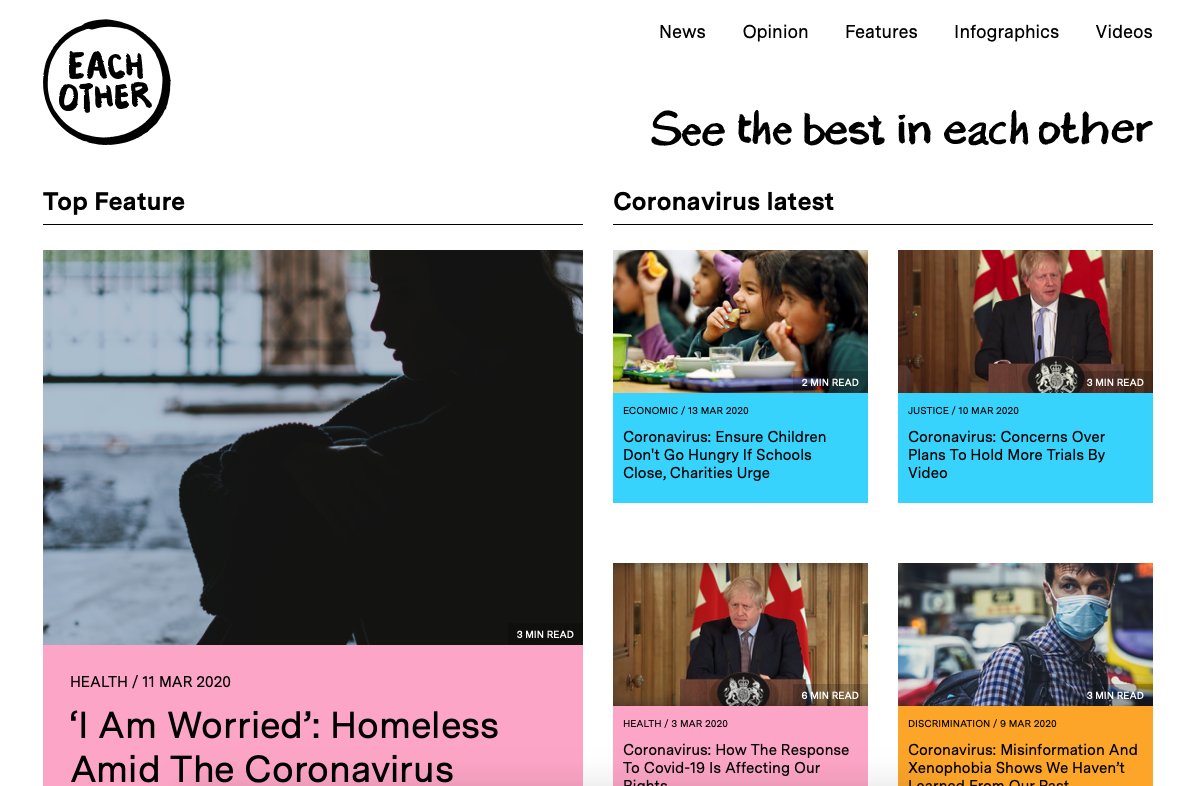
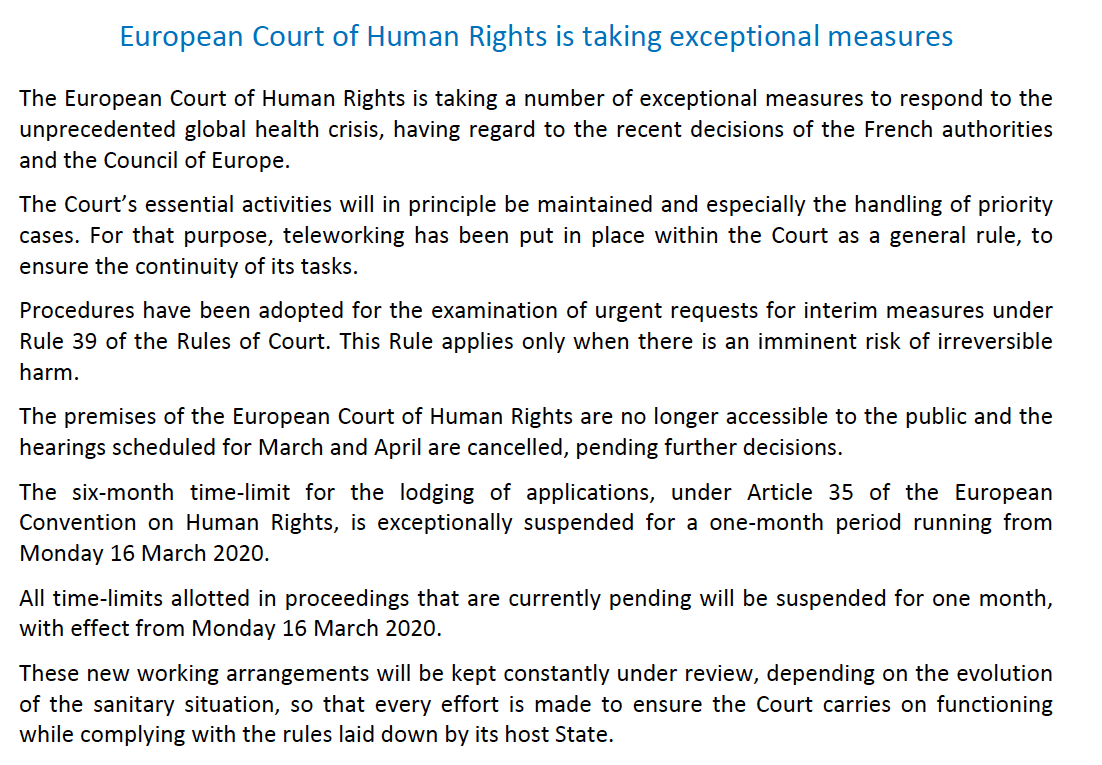 Imminent hearings cancelledhttps://abs.twimg.com/emoji/v2/... draggable="false" alt="🦠" title="Microbe" aria-label="Emoji: Microbe">"Rule 39" measures - urgent applications - will still be consideredhttps://abs.twimg.com/emoji/v2/... draggable="false" alt="🦠" title="Microbe" aria-label="Emoji: Microbe">Time limits have been extended for 1 month https://hudoc.echr.coe.int/eng-press... /51" title="European Court of Human Rights taking some sensible sounding measures:https://abs.twimg.com/emoji/v2/... draggable="false" alt="🦠" title="Microbe" aria-label="Emoji: Microbe">Imminent hearings cancelledhttps://abs.twimg.com/emoji/v2/... draggable="false" alt="🦠" title="Microbe" aria-label="Emoji: Microbe">"Rule 39" measures - urgent applications - will still be consideredhttps://abs.twimg.com/emoji/v2/... draggable="false" alt="🦠" title="Microbe" aria-label="Emoji: Microbe">Time limits have been extended for 1 month https://hudoc.echr.coe.int/eng-press... /51" class="img-responsive" style="max-width:100%;"/>
Imminent hearings cancelledhttps://abs.twimg.com/emoji/v2/... draggable="false" alt="🦠" title="Microbe" aria-label="Emoji: Microbe">"Rule 39" measures - urgent applications - will still be consideredhttps://abs.twimg.com/emoji/v2/... draggable="false" alt="🦠" title="Microbe" aria-label="Emoji: Microbe">Time limits have been extended for 1 month https://hudoc.echr.coe.int/eng-press... /51" title="European Court of Human Rights taking some sensible sounding measures:https://abs.twimg.com/emoji/v2/... draggable="false" alt="🦠" title="Microbe" aria-label="Emoji: Microbe">Imminent hearings cancelledhttps://abs.twimg.com/emoji/v2/... draggable="false" alt="🦠" title="Microbe" aria-label="Emoji: Microbe">"Rule 39" measures - urgent applications - will still be consideredhttps://abs.twimg.com/emoji/v2/... draggable="false" alt="🦠" title="Microbe" aria-label="Emoji: Microbe">Time limits have been extended for 1 month https://hudoc.echr.coe.int/eng-press... /51" class="img-responsive" style="max-width:100%;"/>
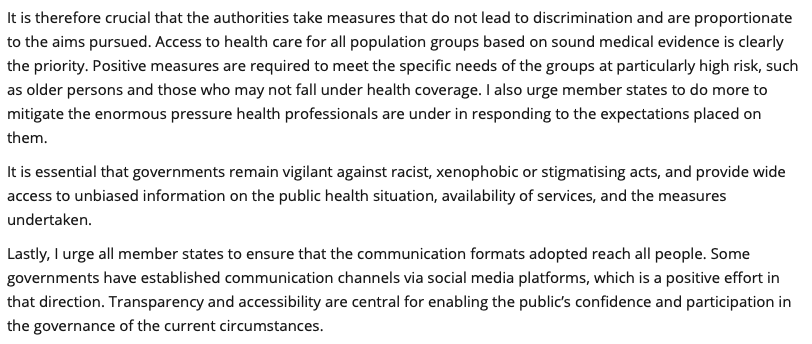
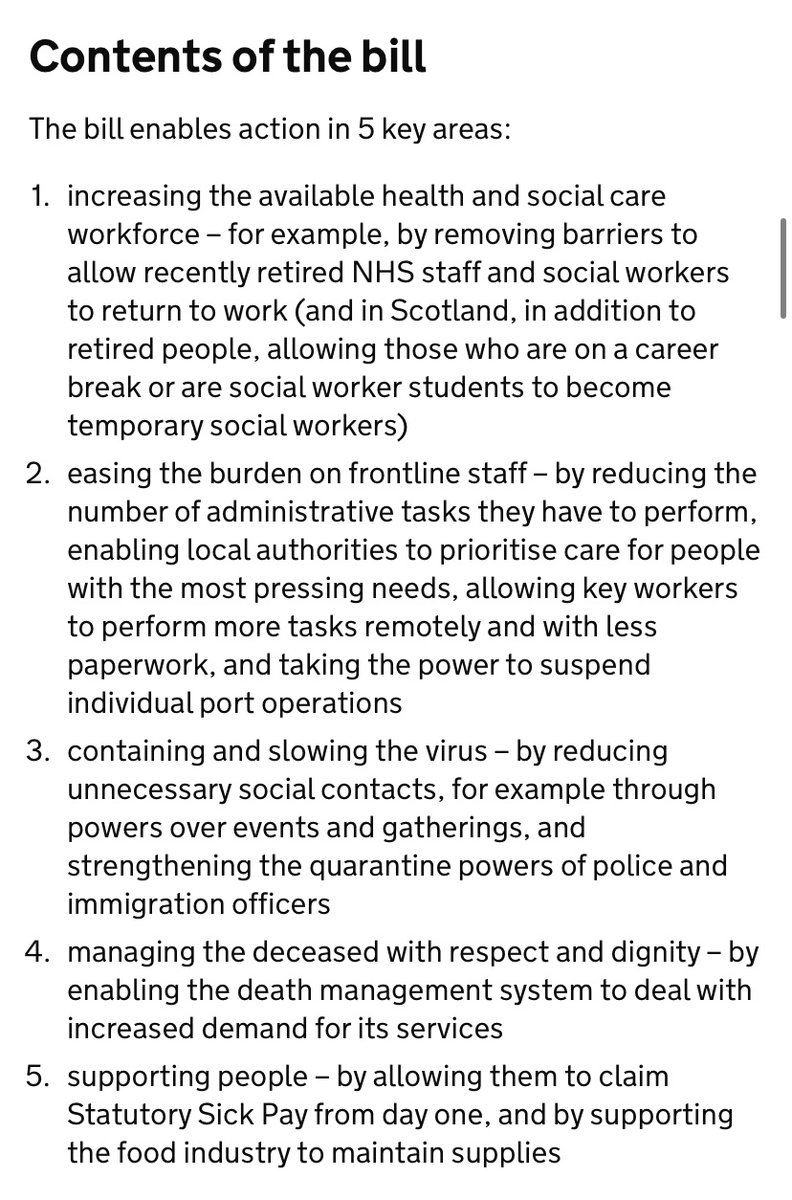
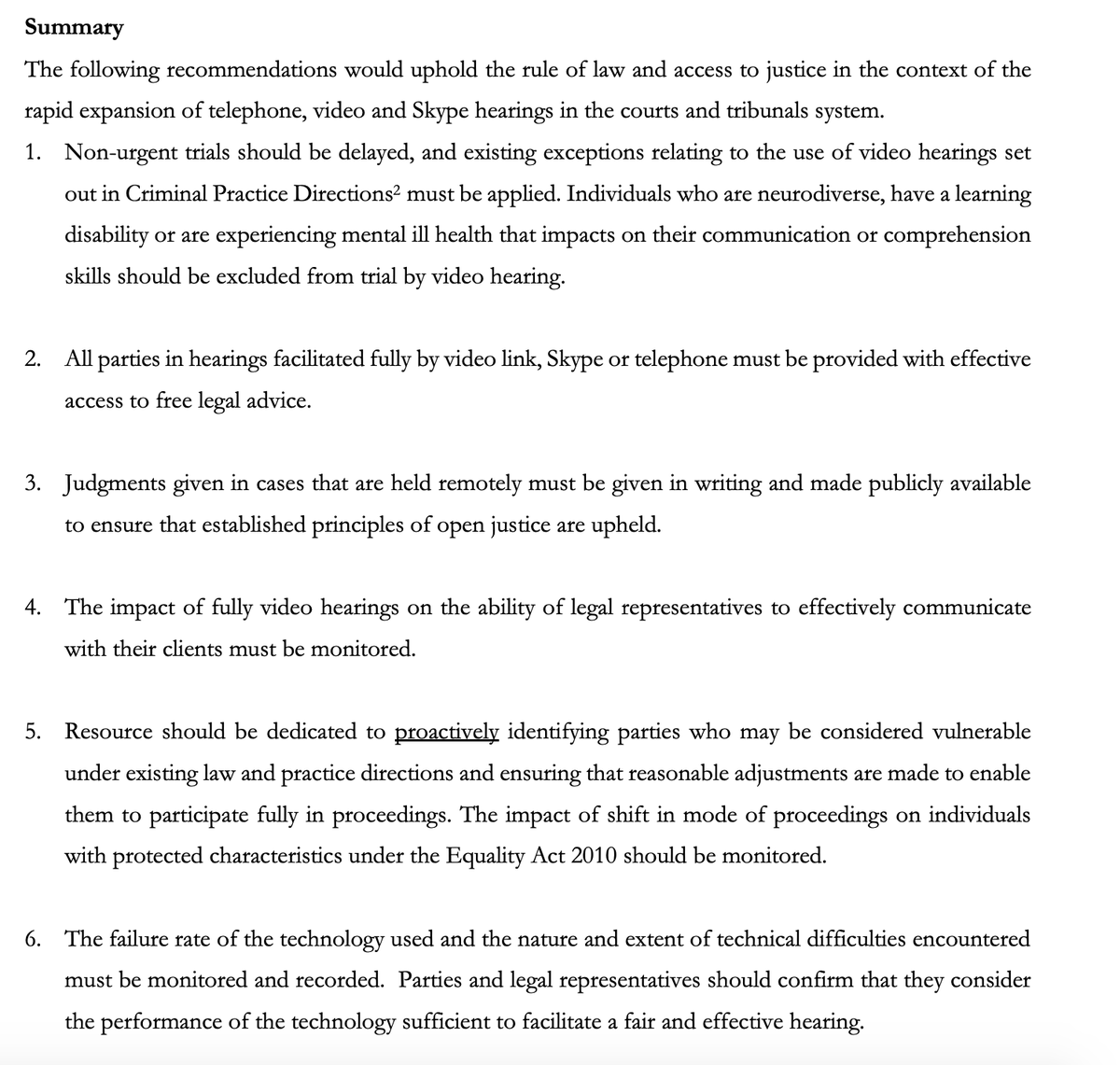

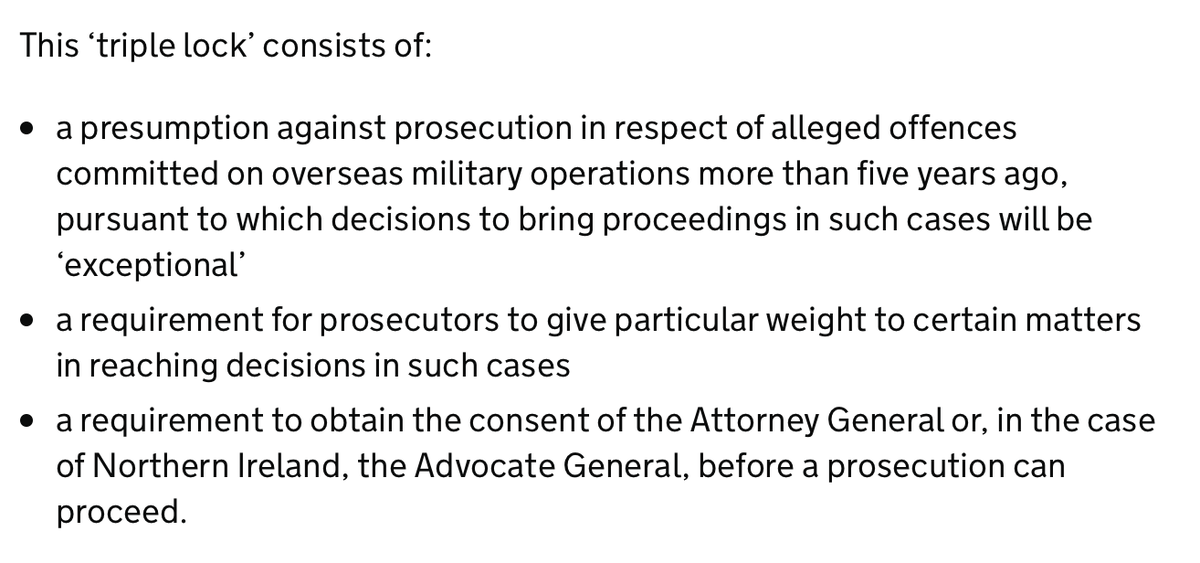 - yesterday govt published its Overseas Operations Bill making it much harder to prosecute soldiers for bad things which happen overseas /64 https://www.gov.uk/governmen..." title="Another human rights implication of #Coronavirus is the mischief that happens whilst everyone is focusing on the https://abs.twimg.com/emoji/v2/... draggable="false" alt="🦠" title="Microbe" aria-label="Emoji: Microbe"> - yesterday govt published its Overseas Operations Bill making it much harder to prosecute soldiers for bad things which happen overseas /64 https://www.gov.uk/governmen...">
- yesterday govt published its Overseas Operations Bill making it much harder to prosecute soldiers for bad things which happen overseas /64 https://www.gov.uk/governmen..." title="Another human rights implication of #Coronavirus is the mischief that happens whilst everyone is focusing on the https://abs.twimg.com/emoji/v2/... draggable="false" alt="🦠" title="Microbe" aria-label="Emoji: Microbe"> - yesterday govt published its Overseas Operations Bill making it much harder to prosecute soldiers for bad things which happen overseas /64 https://www.gov.uk/governmen...">
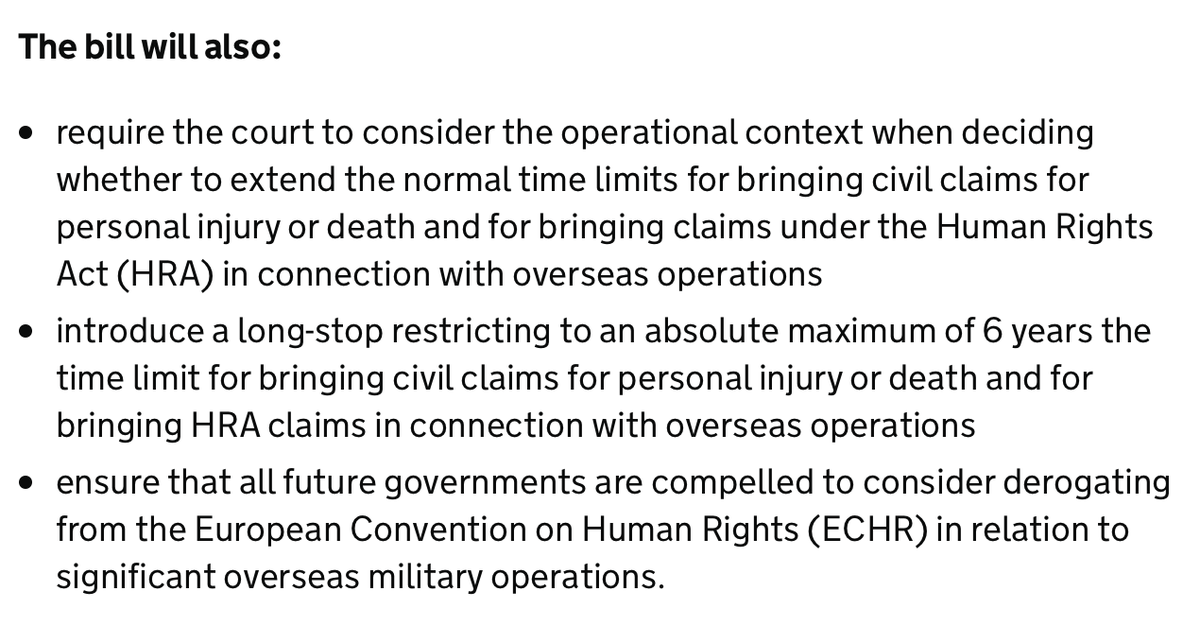 - yesterday govt published its Overseas Operations Bill making it much harder to prosecute soldiers for bad things which happen overseas /64 https://www.gov.uk/governmen..." title="Another human rights implication of #Coronavirus is the mischief that happens whilst everyone is focusing on the https://abs.twimg.com/emoji/v2/... draggable="false" alt="🦠" title="Microbe" aria-label="Emoji: Microbe"> - yesterday govt published its Overseas Operations Bill making it much harder to prosecute soldiers for bad things which happen overseas /64 https://www.gov.uk/governmen...">
- yesterday govt published its Overseas Operations Bill making it much harder to prosecute soldiers for bad things which happen overseas /64 https://www.gov.uk/governmen..." title="Another human rights implication of #Coronavirus is the mischief that happens whilst everyone is focusing on the https://abs.twimg.com/emoji/v2/... draggable="false" alt="🦠" title="Microbe" aria-label="Emoji: Microbe"> - yesterday govt published its Overseas Operations Bill making it much harder to prosecute soldiers for bad things which happen overseas /64 https://www.gov.uk/governmen...">
